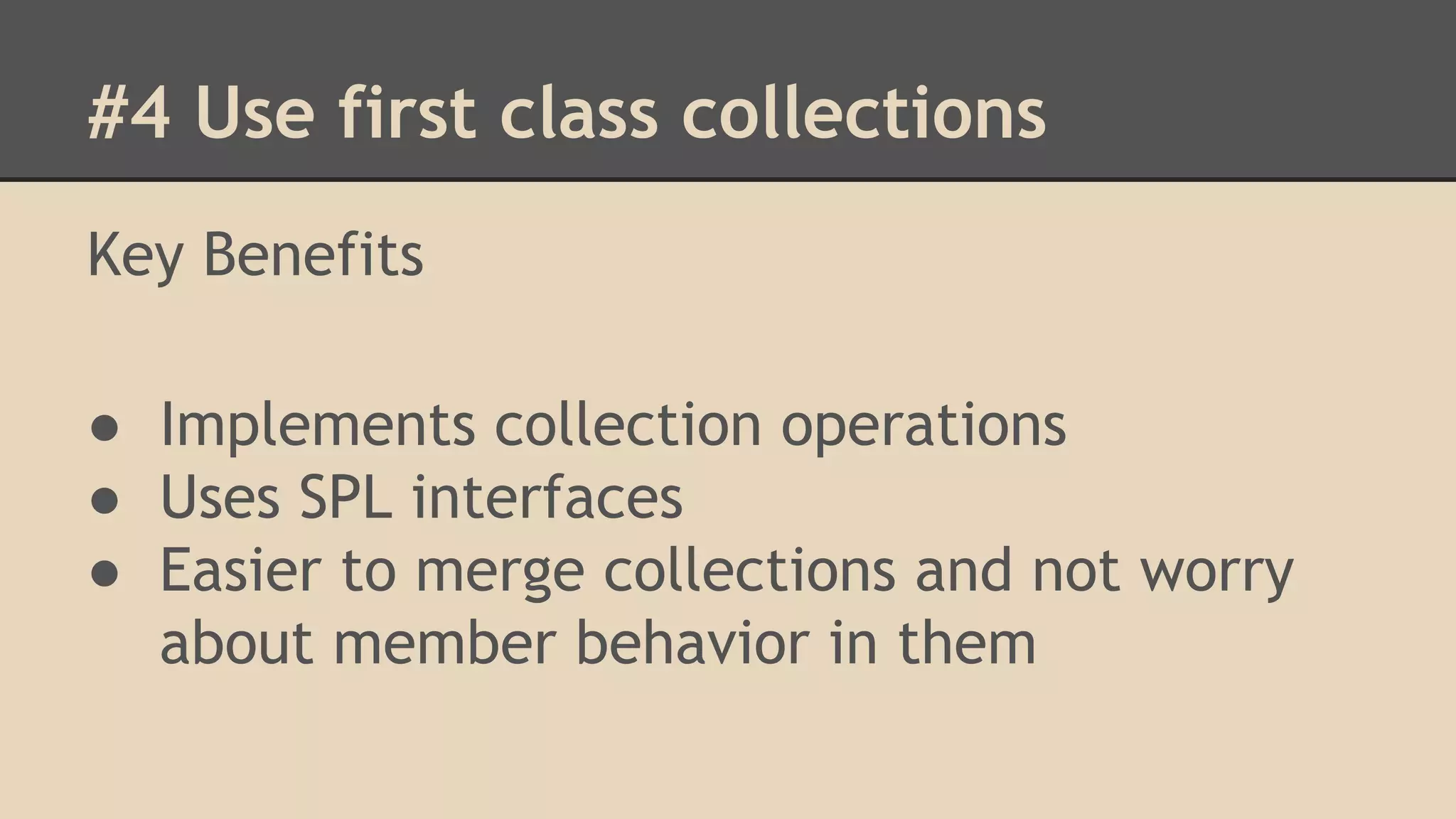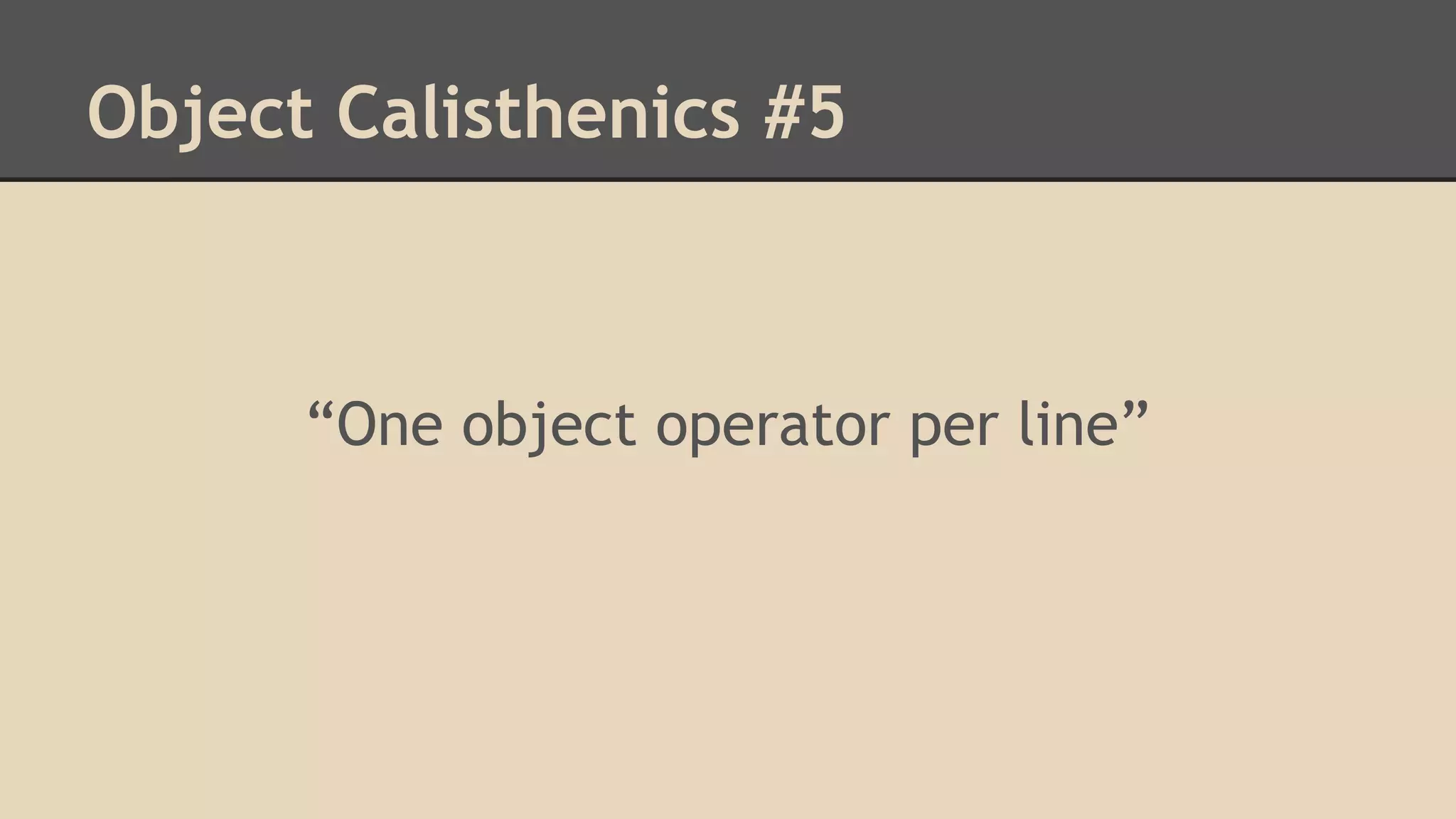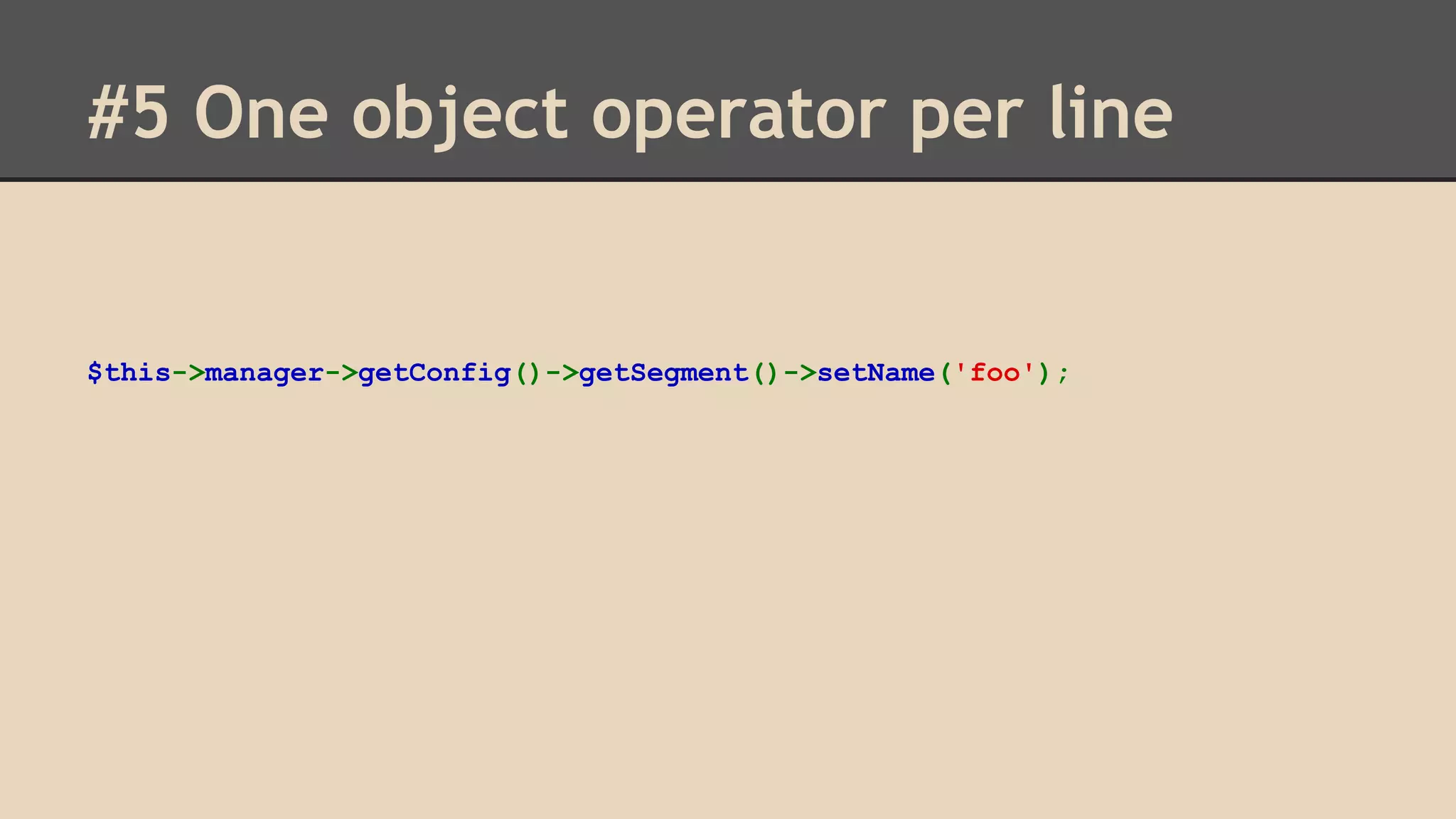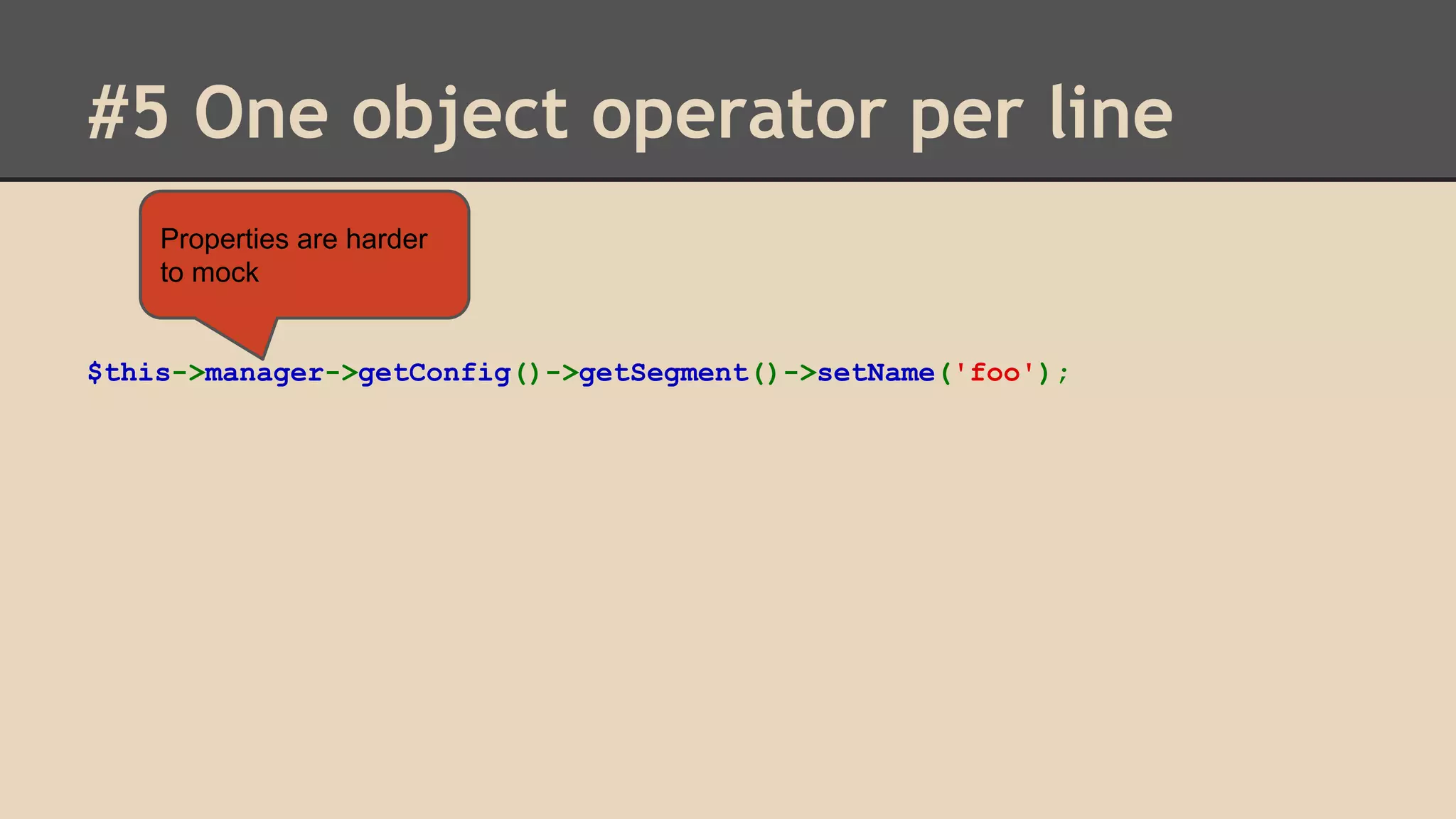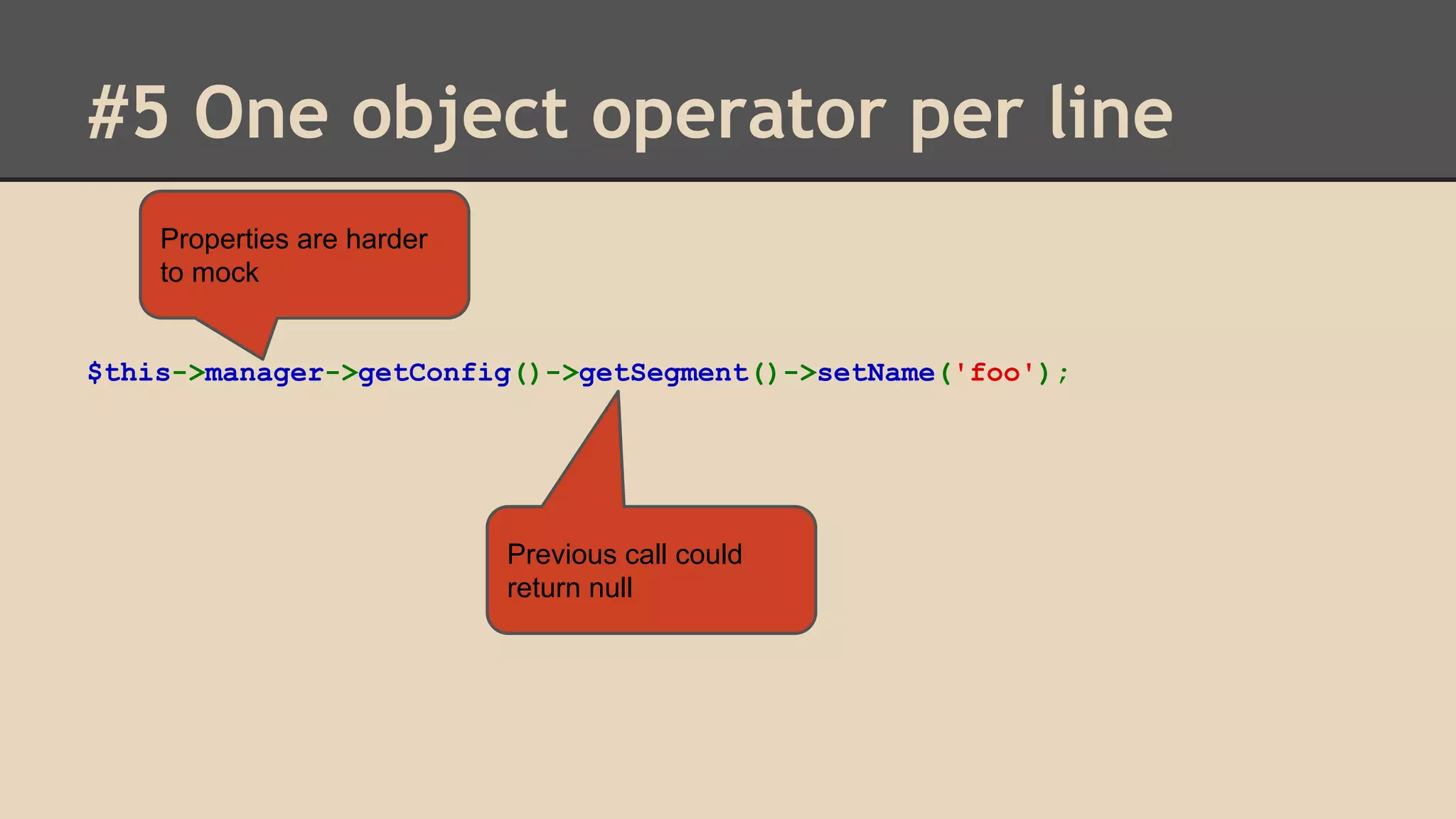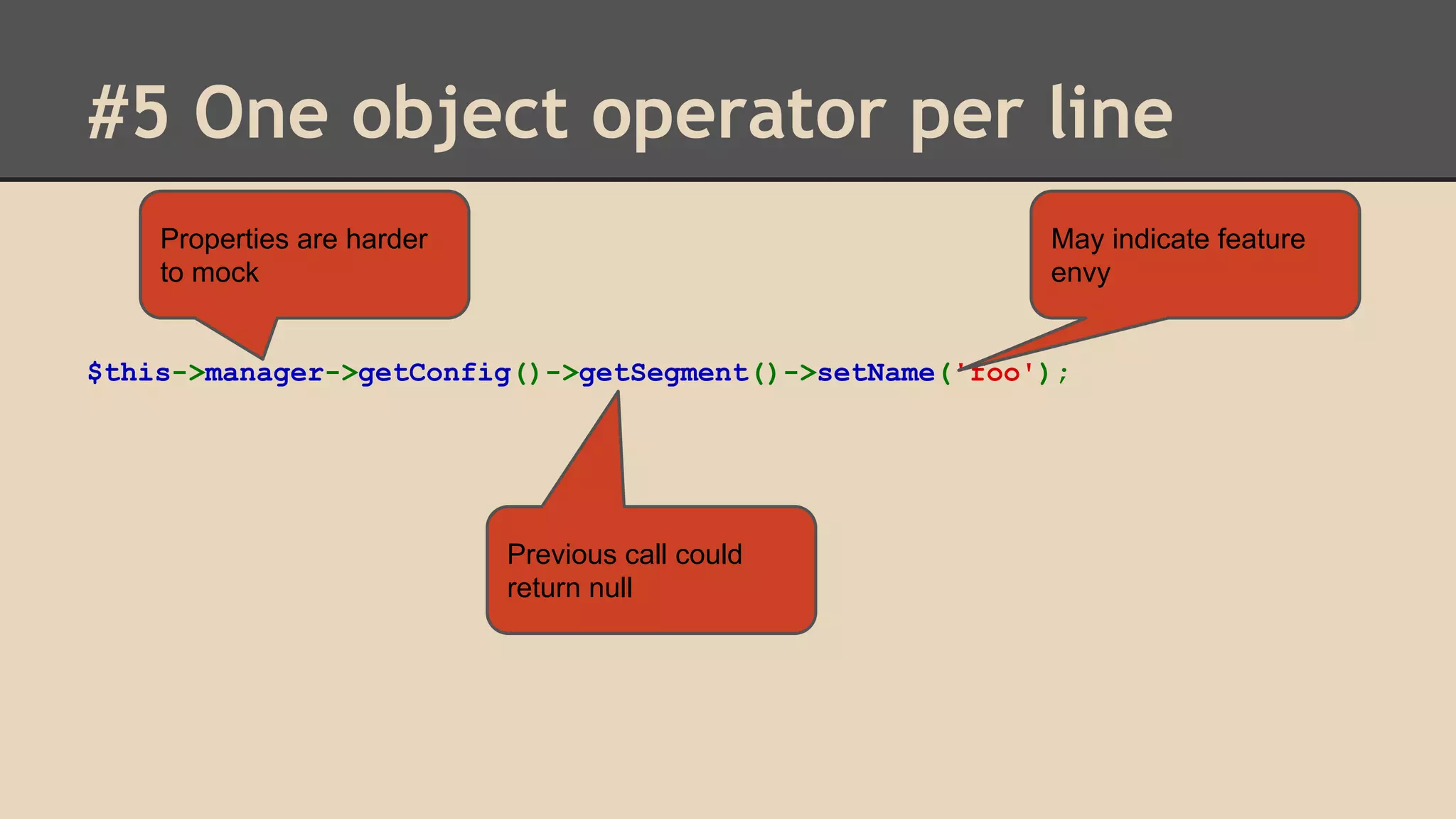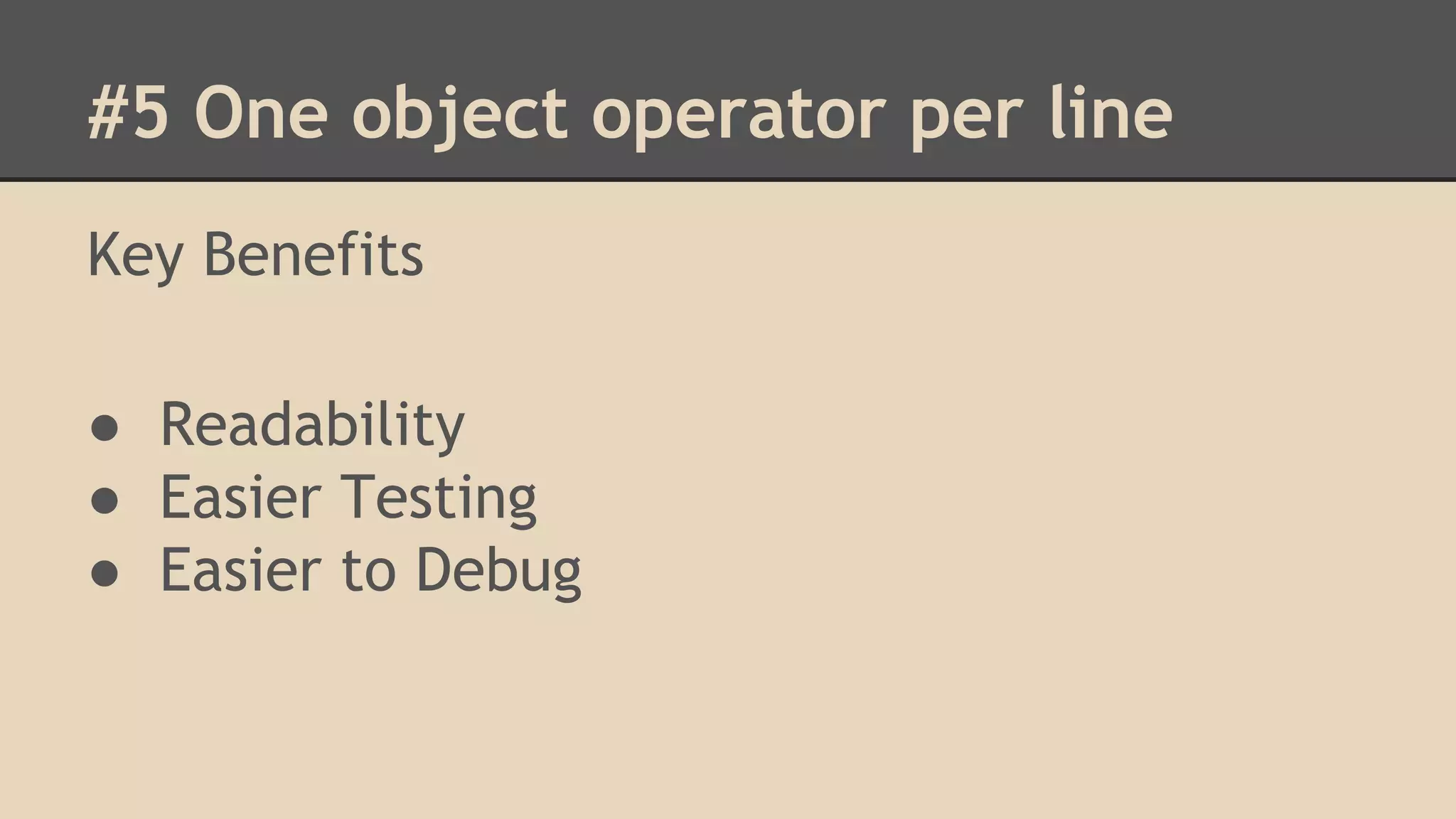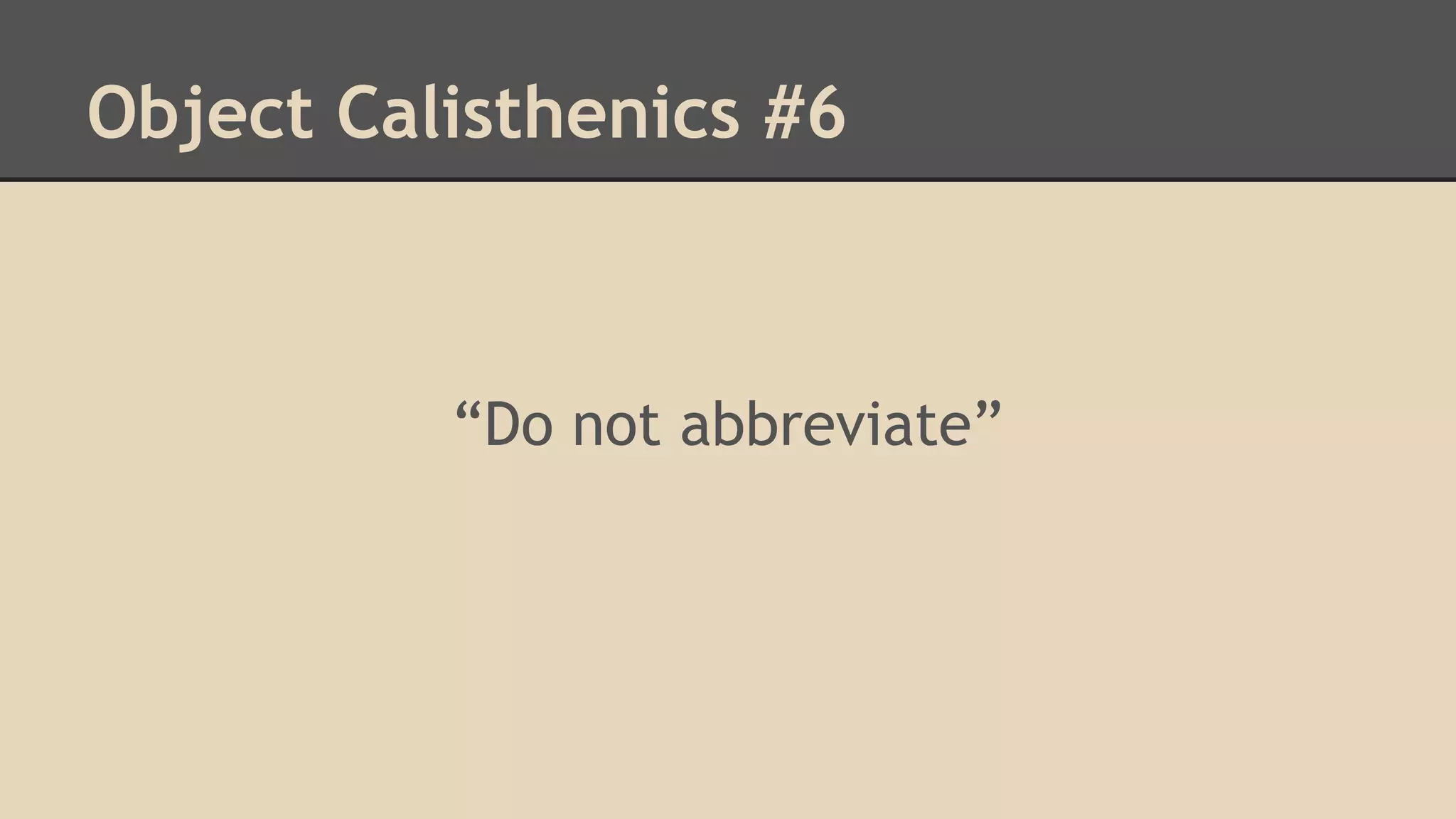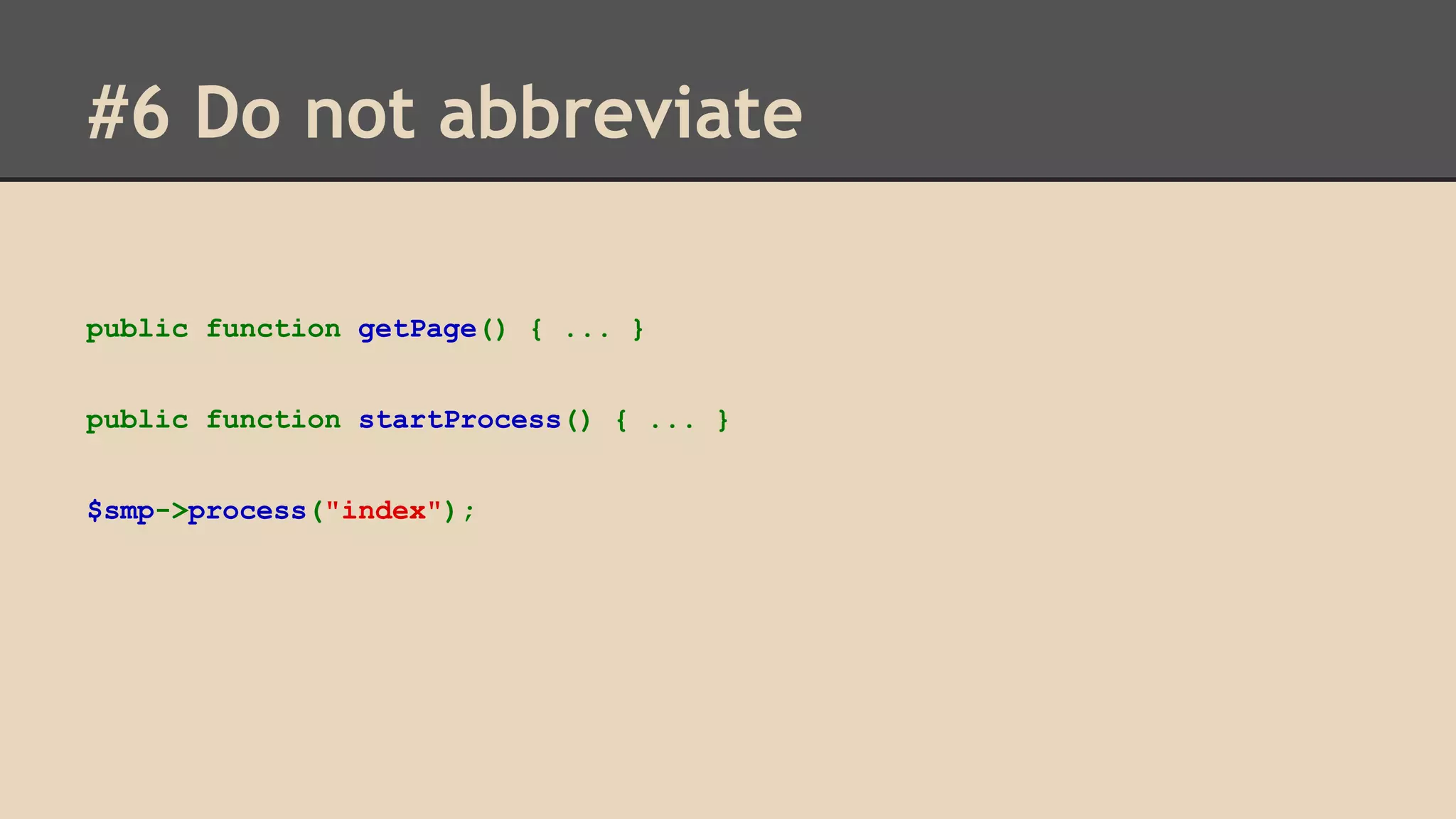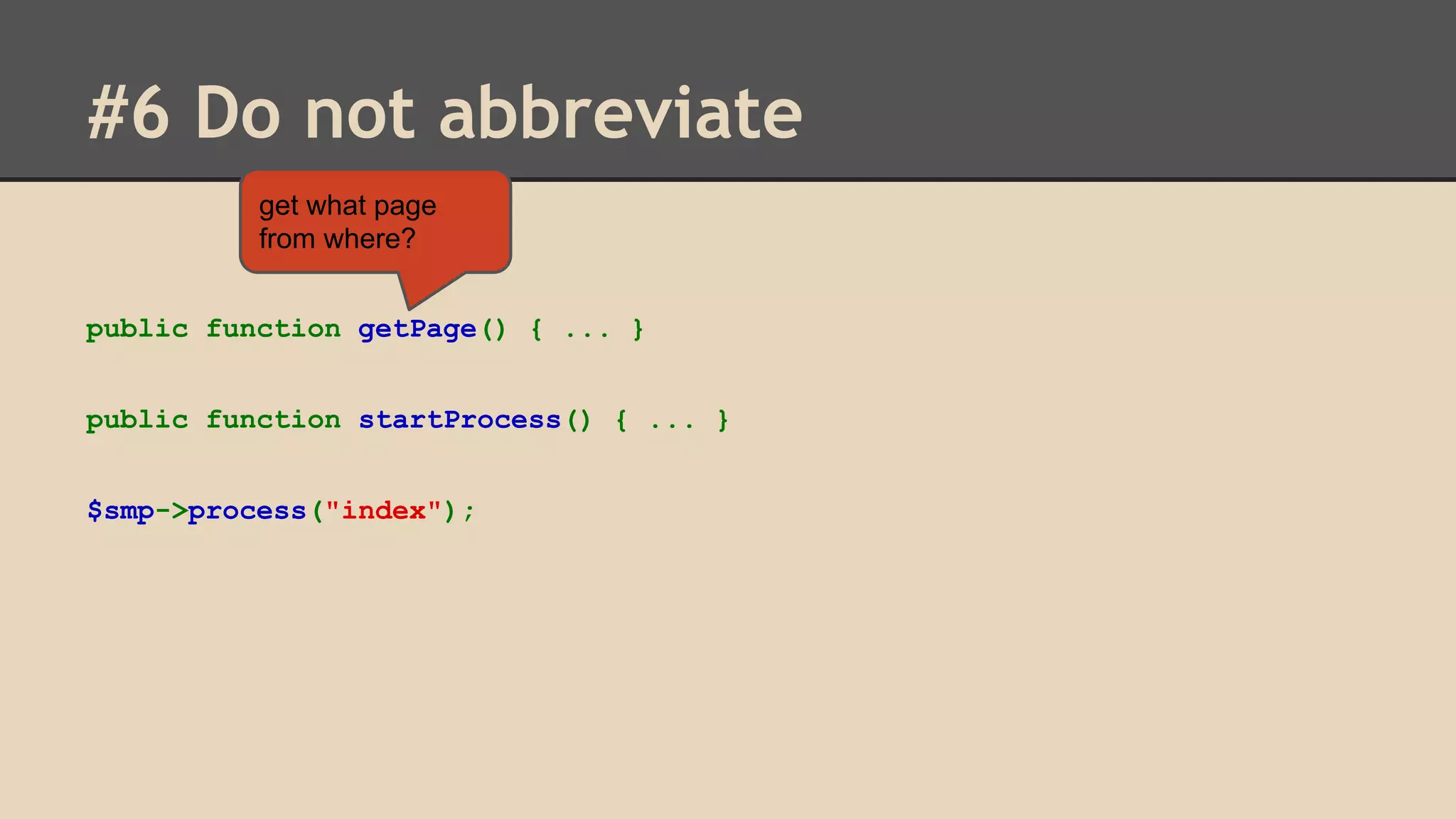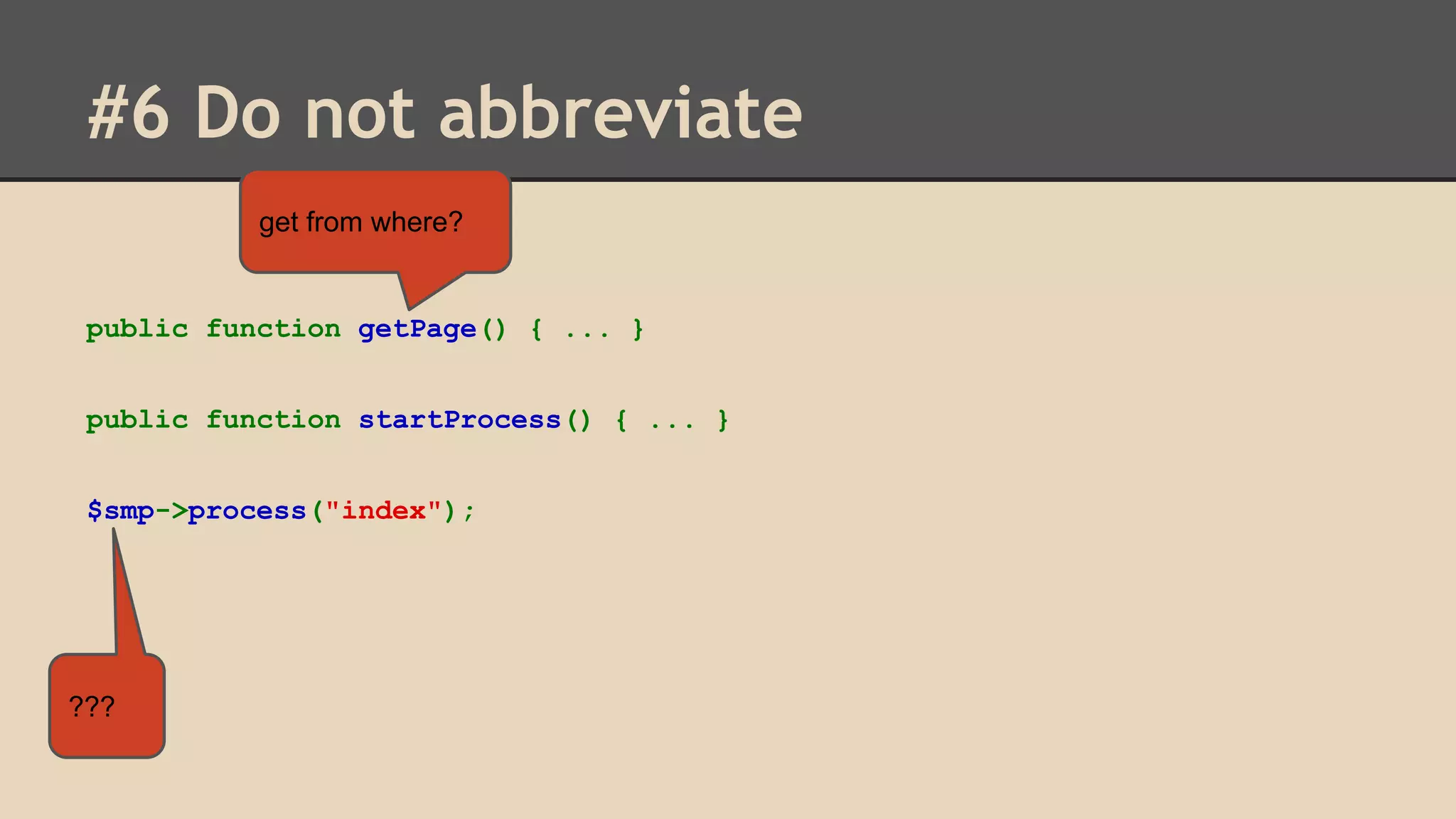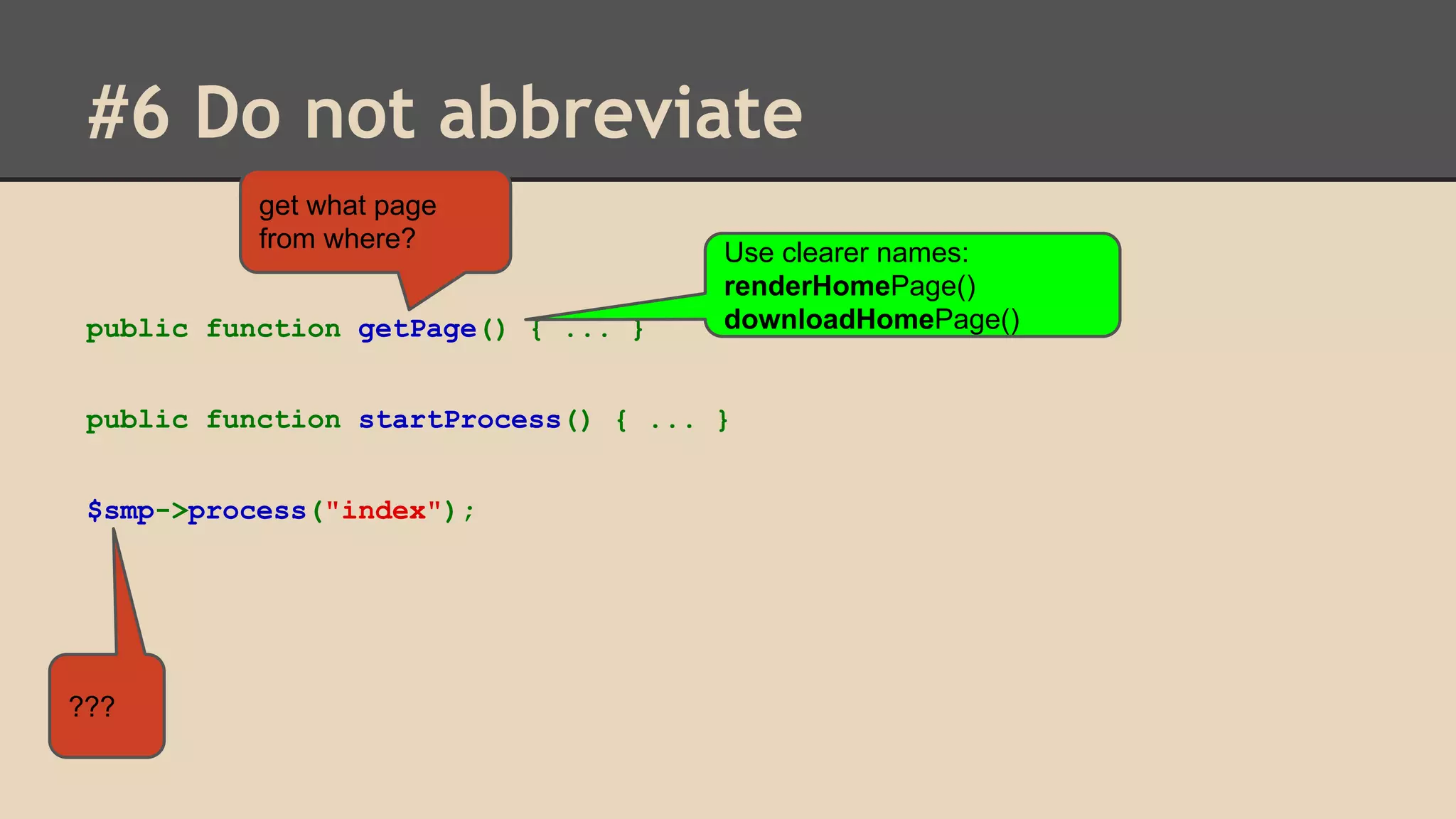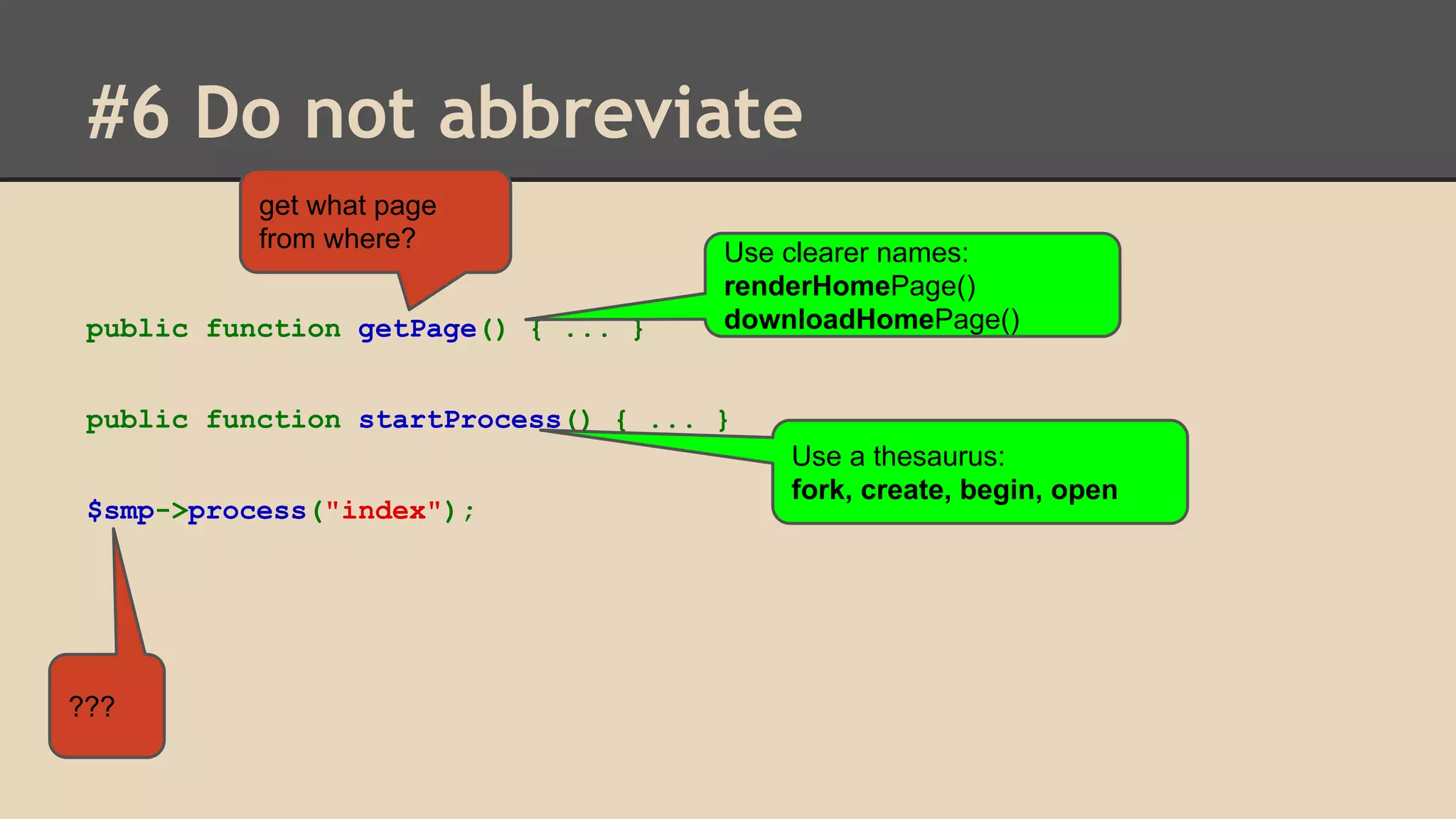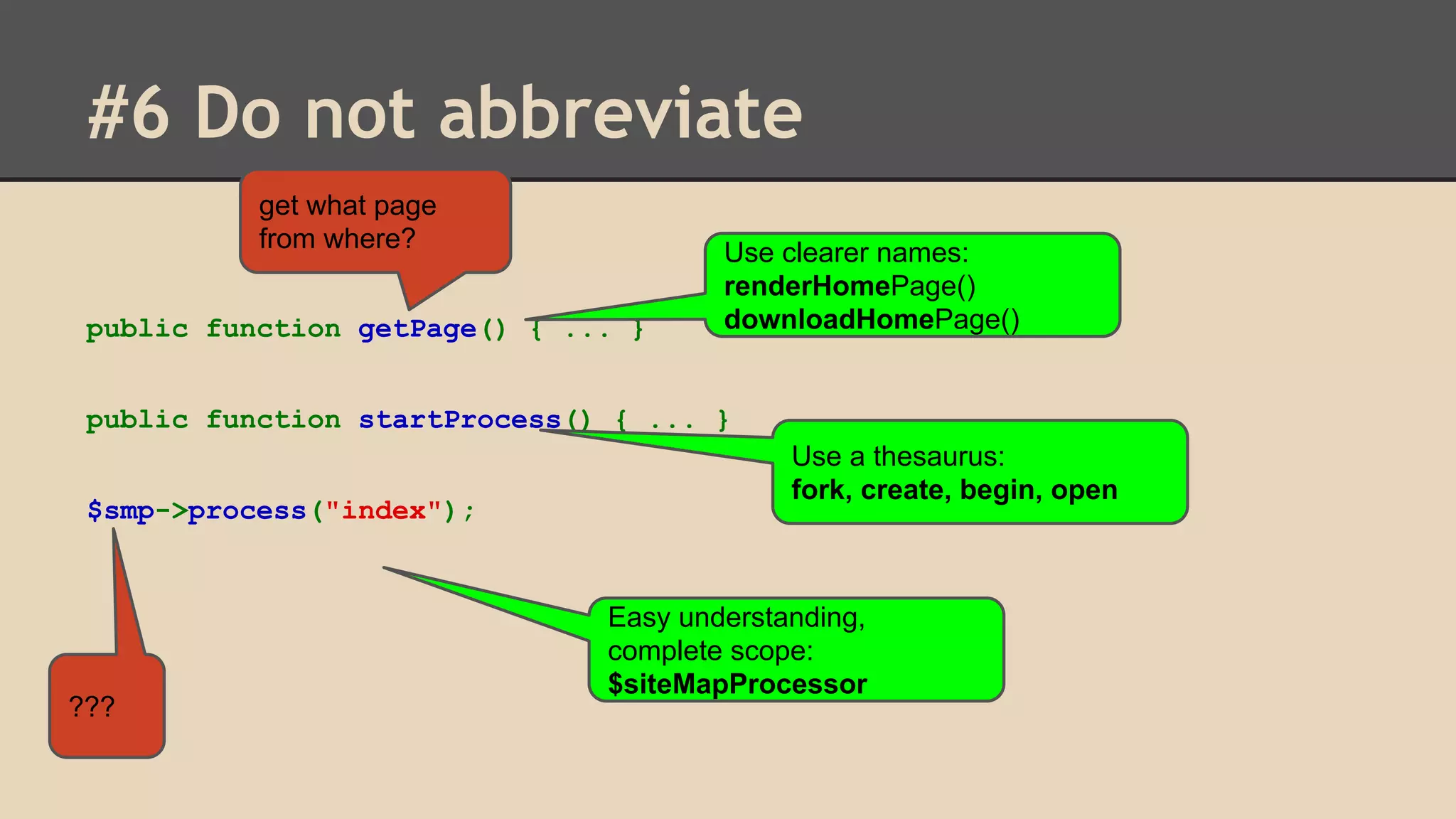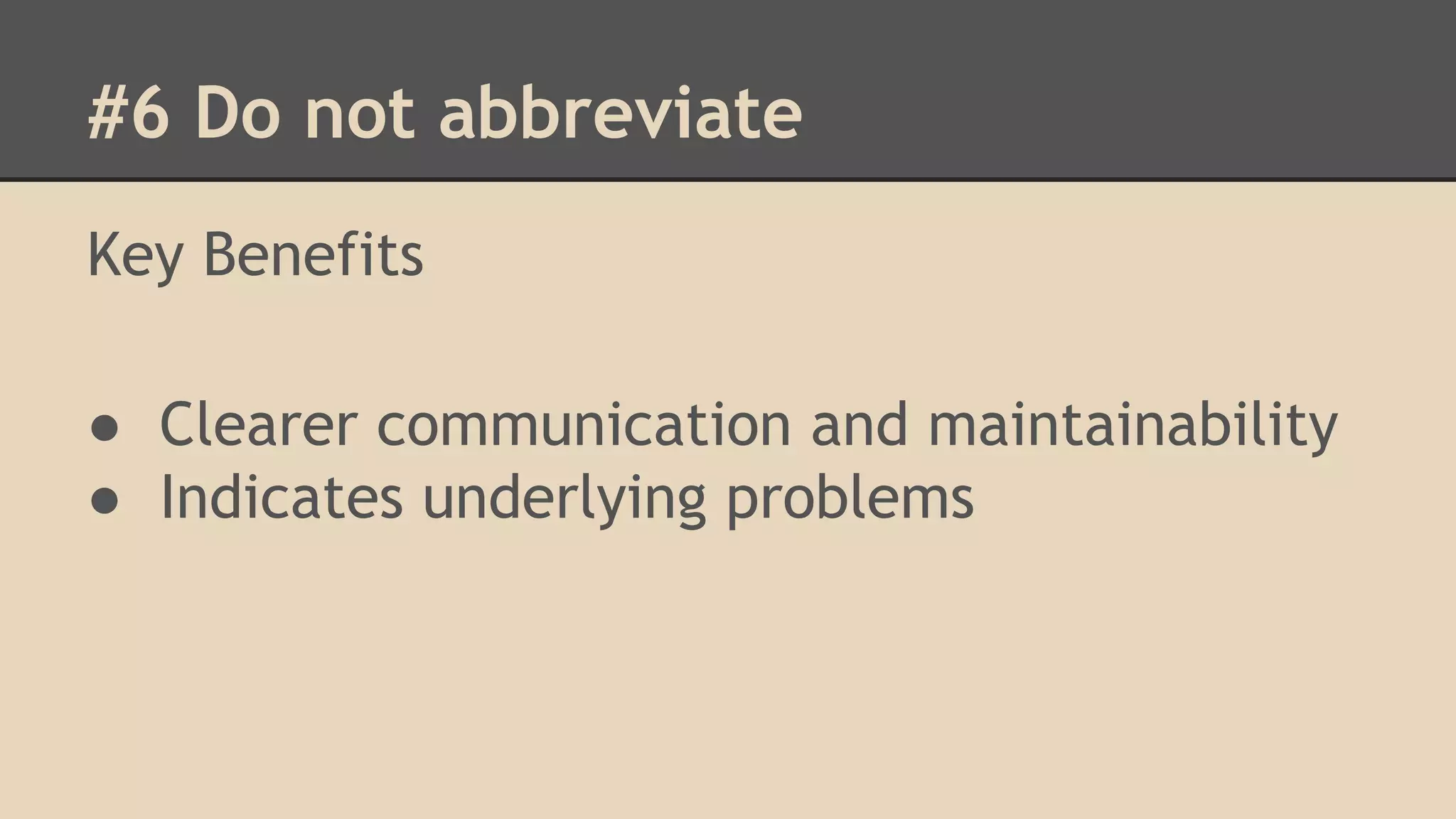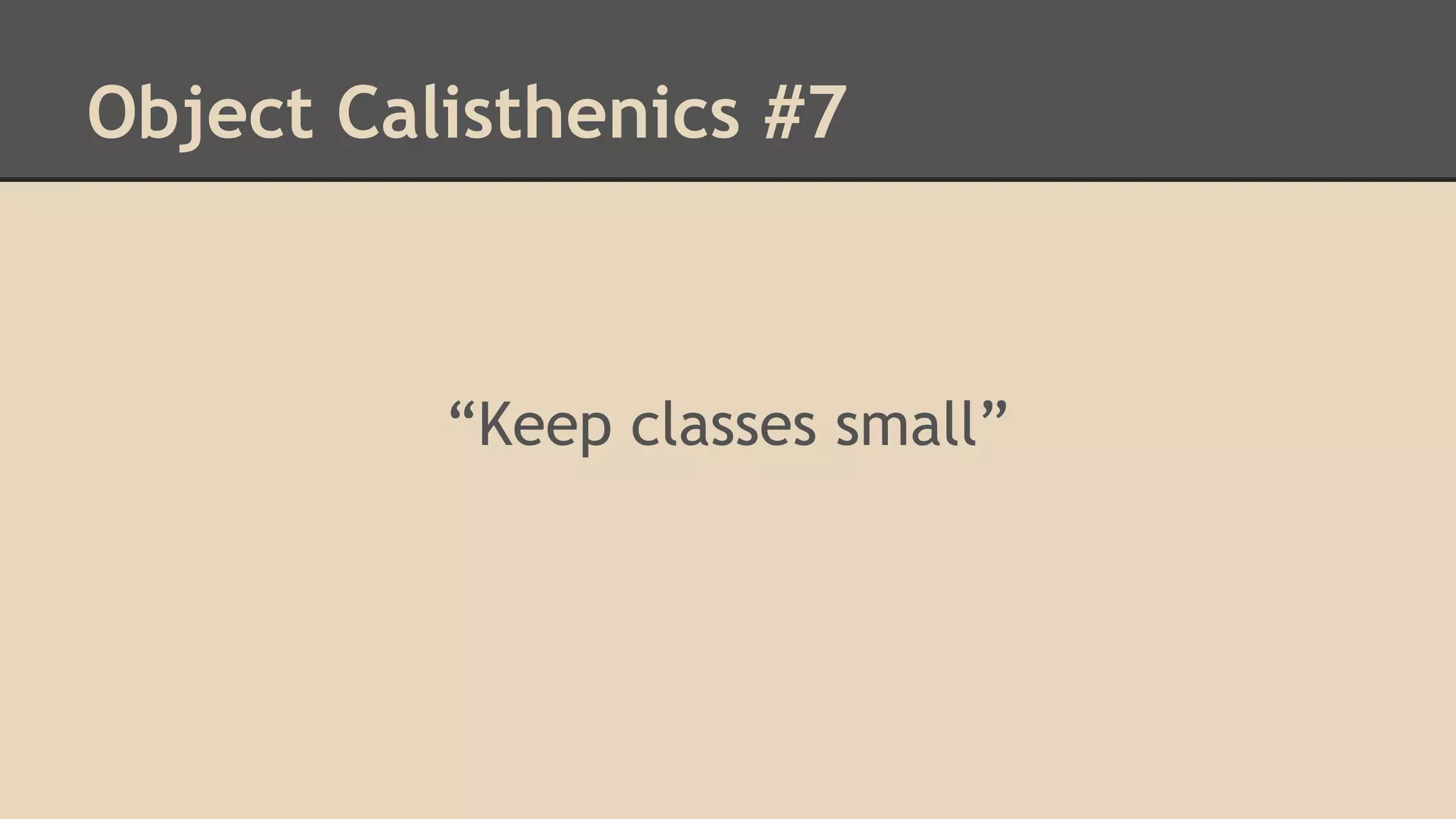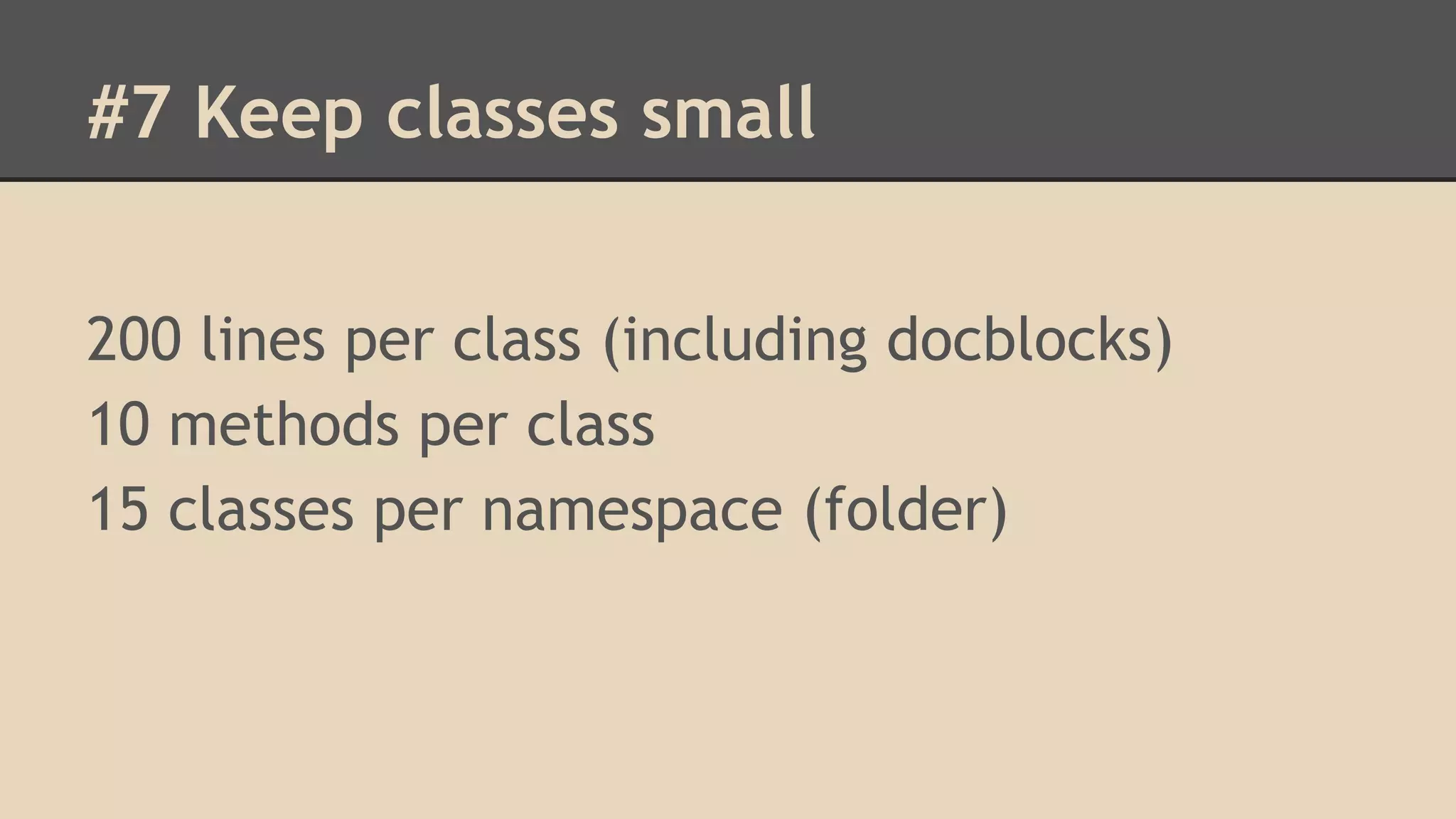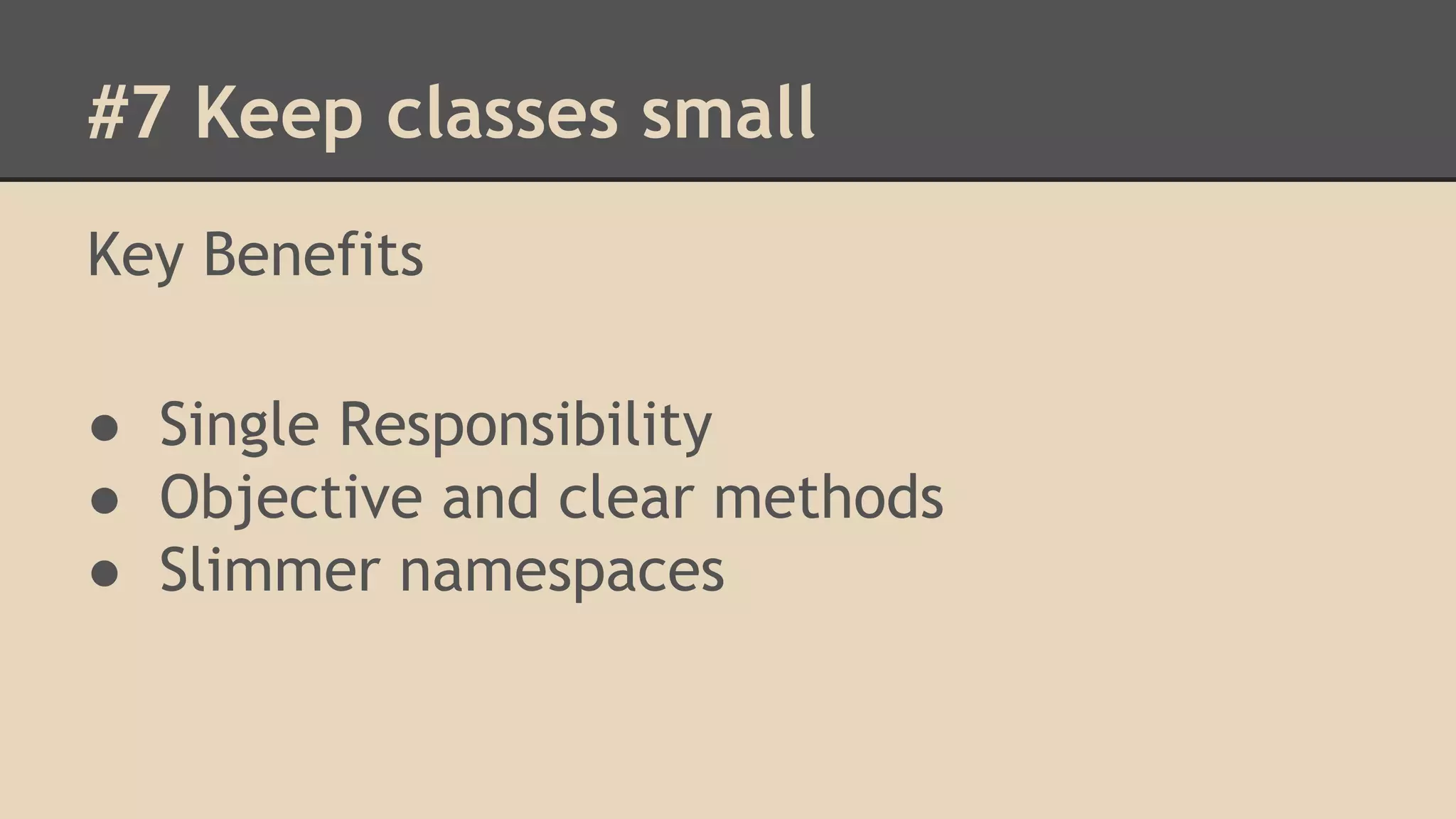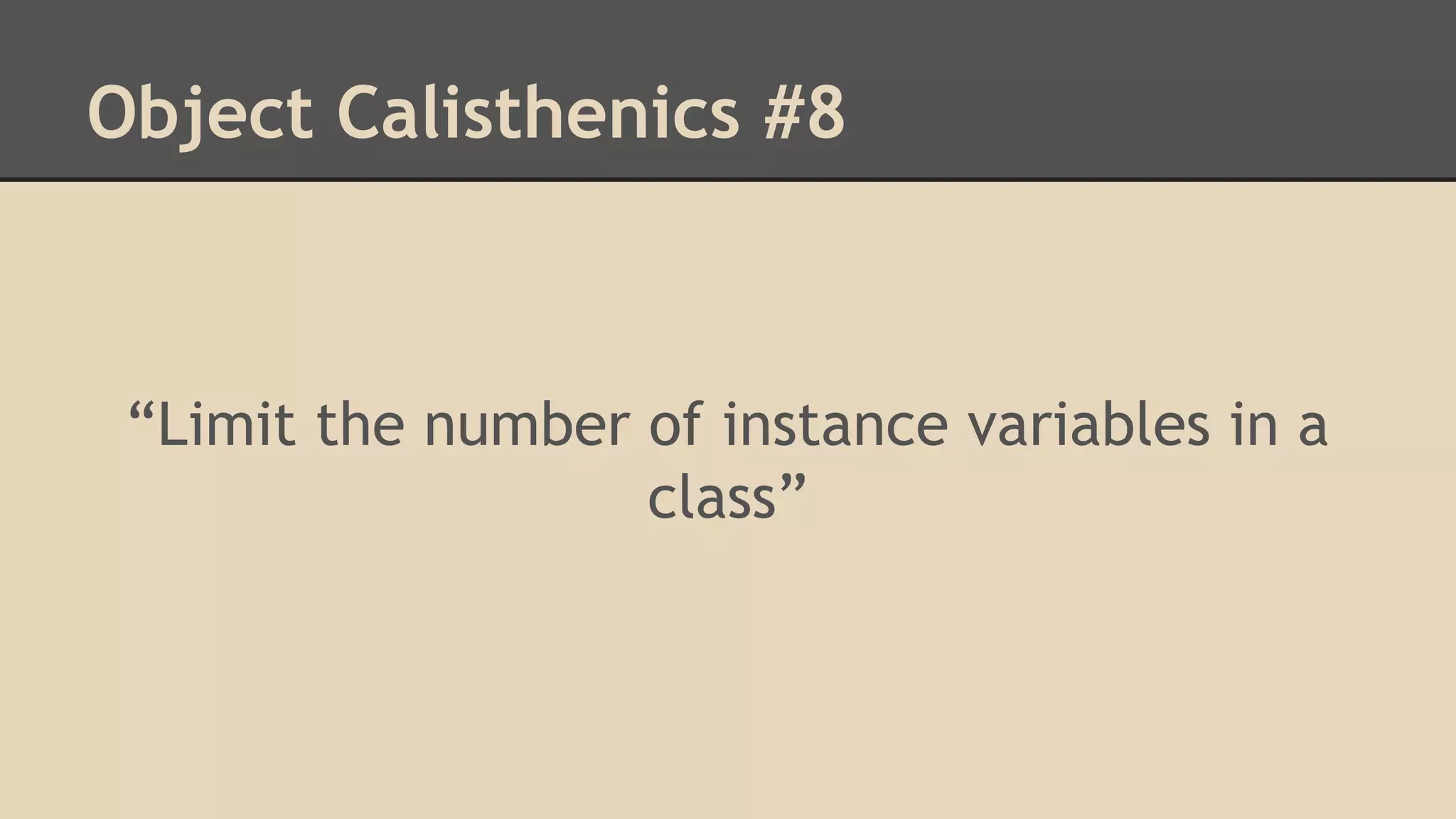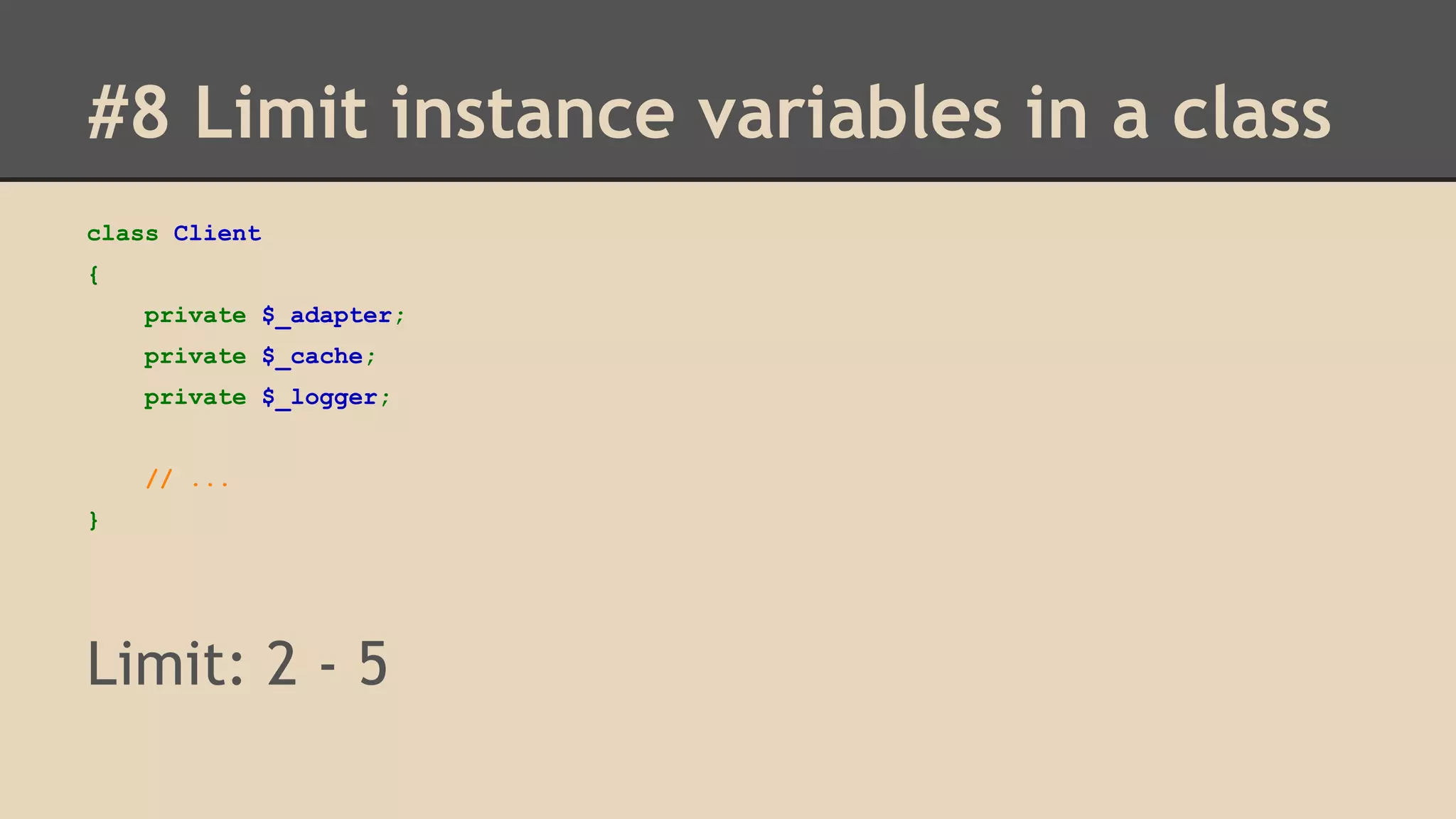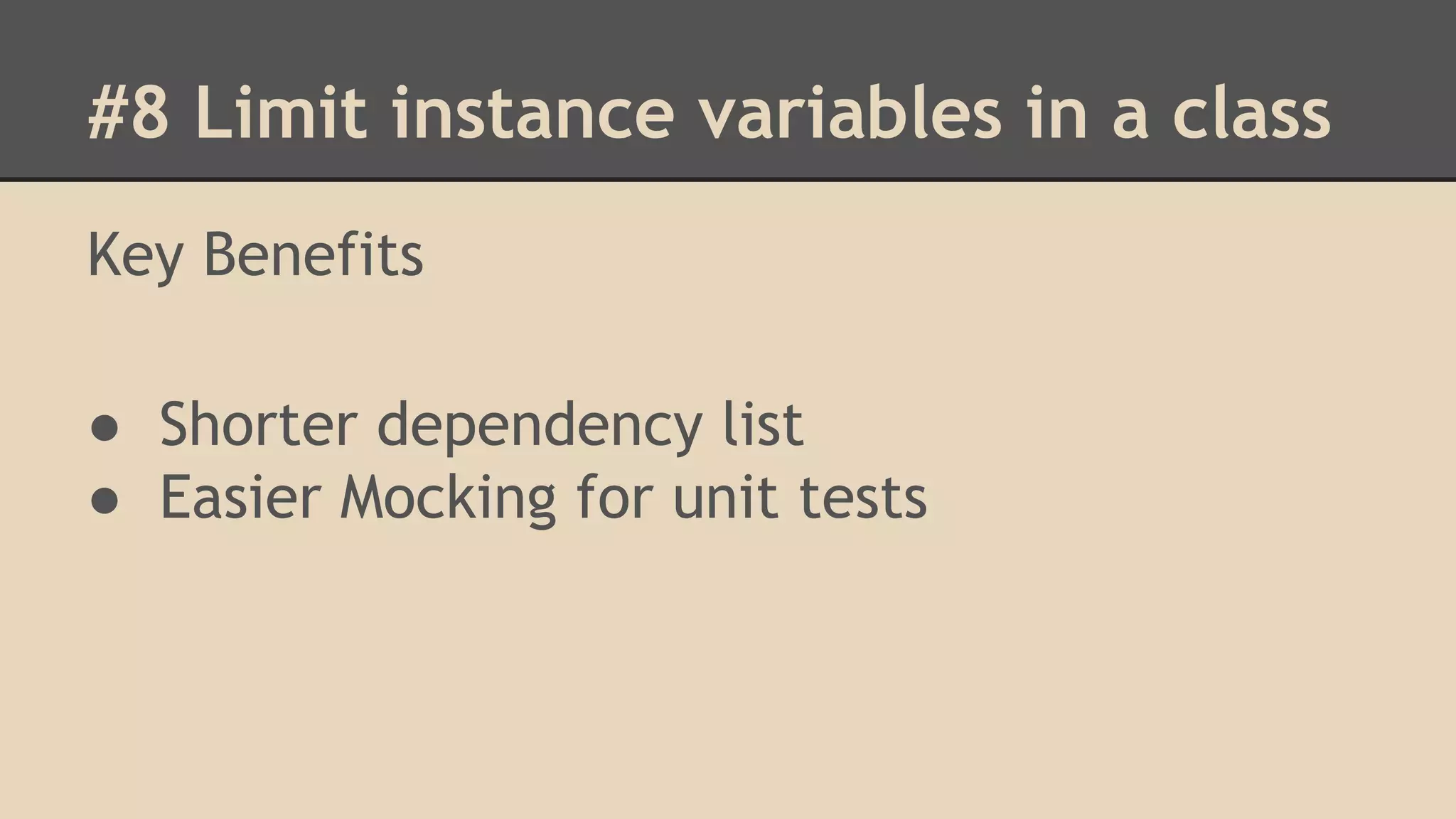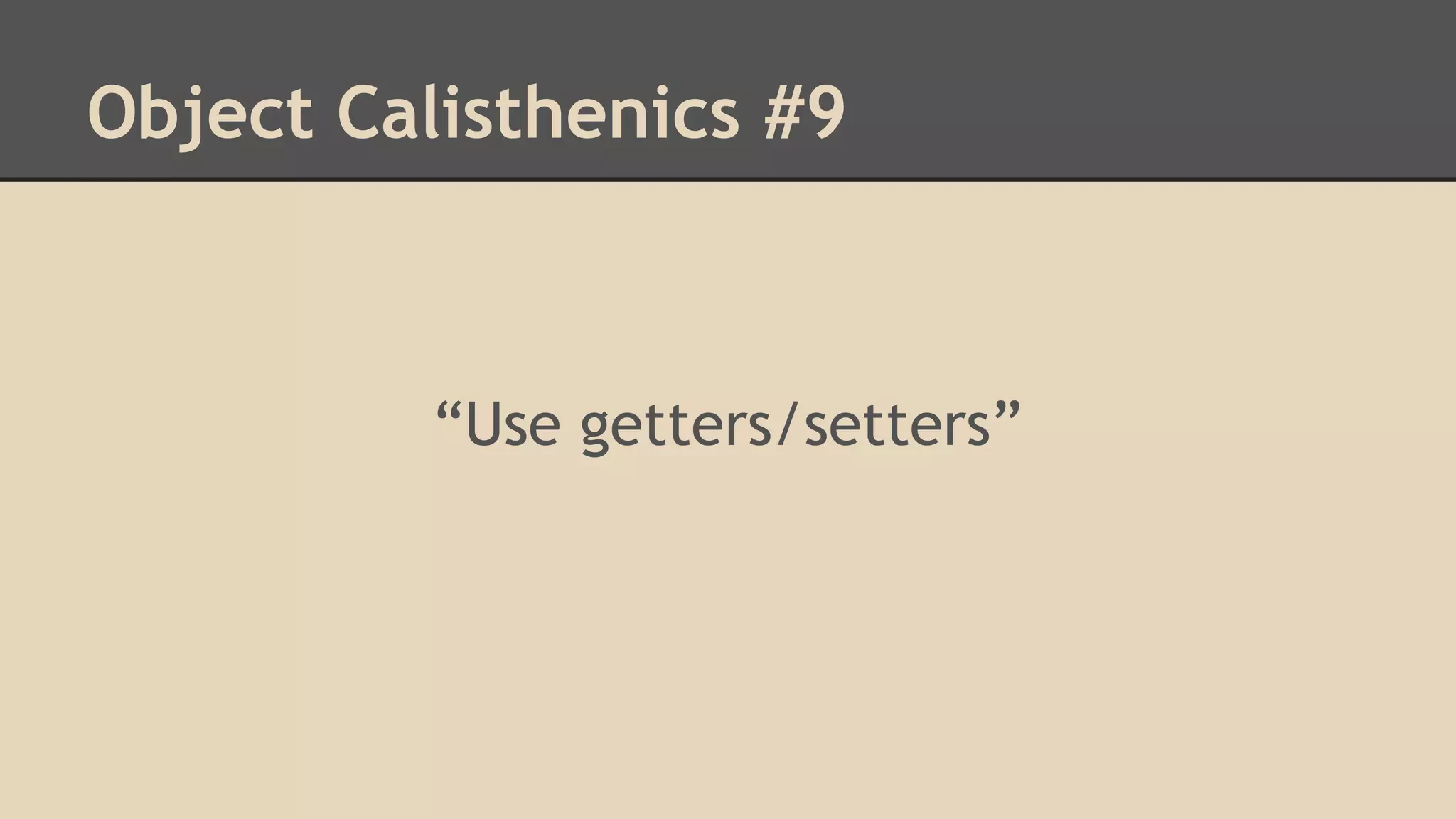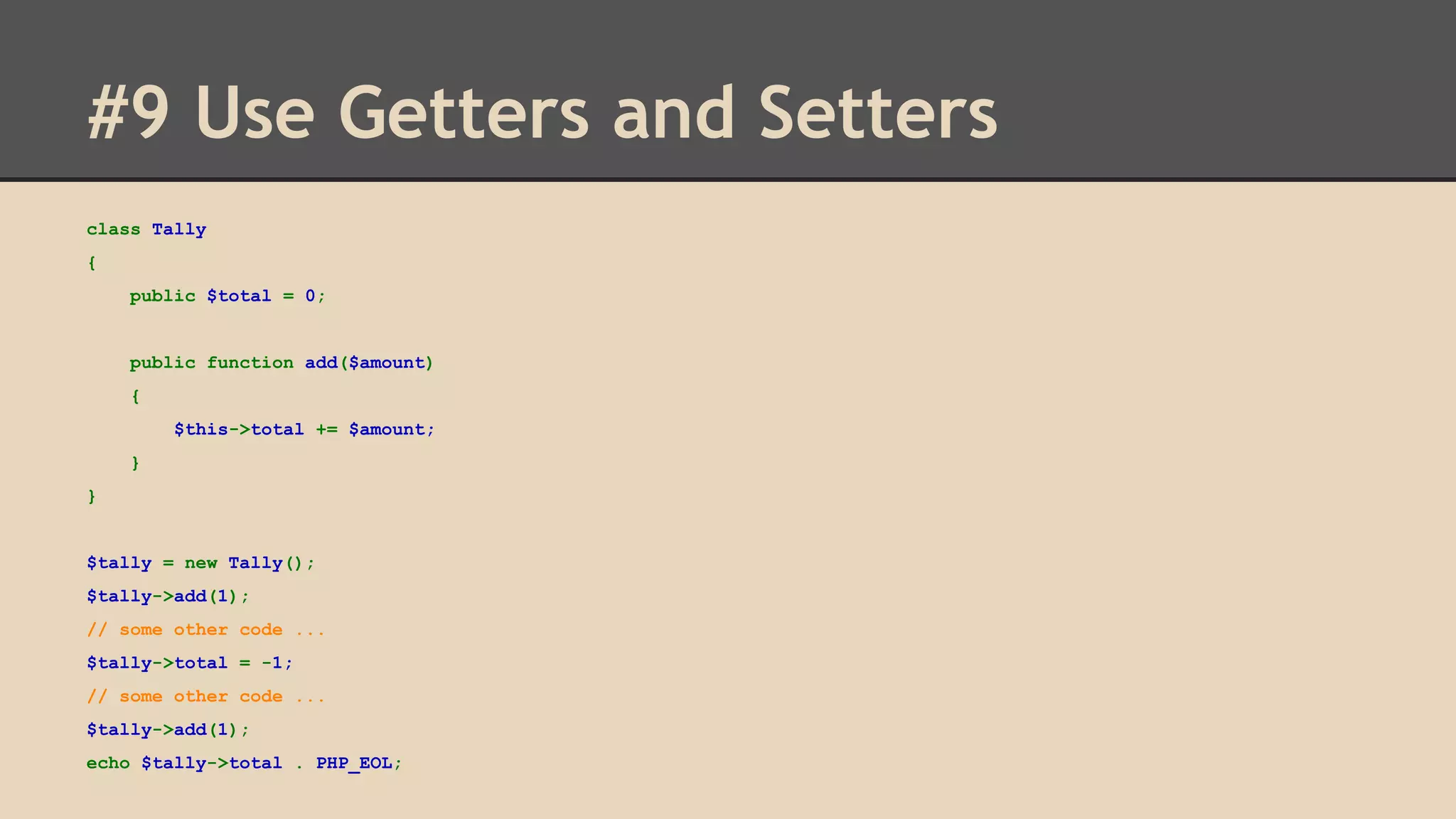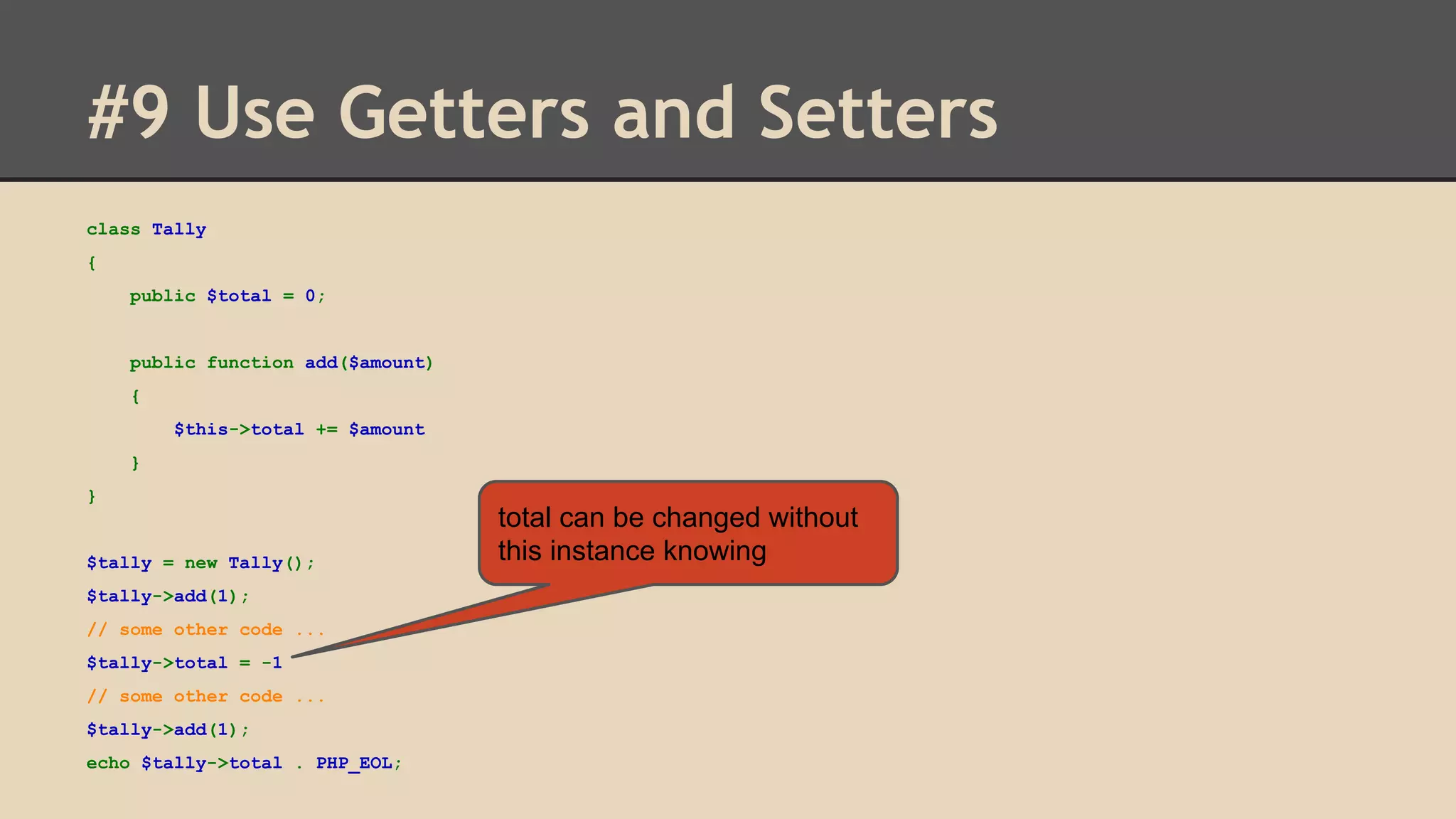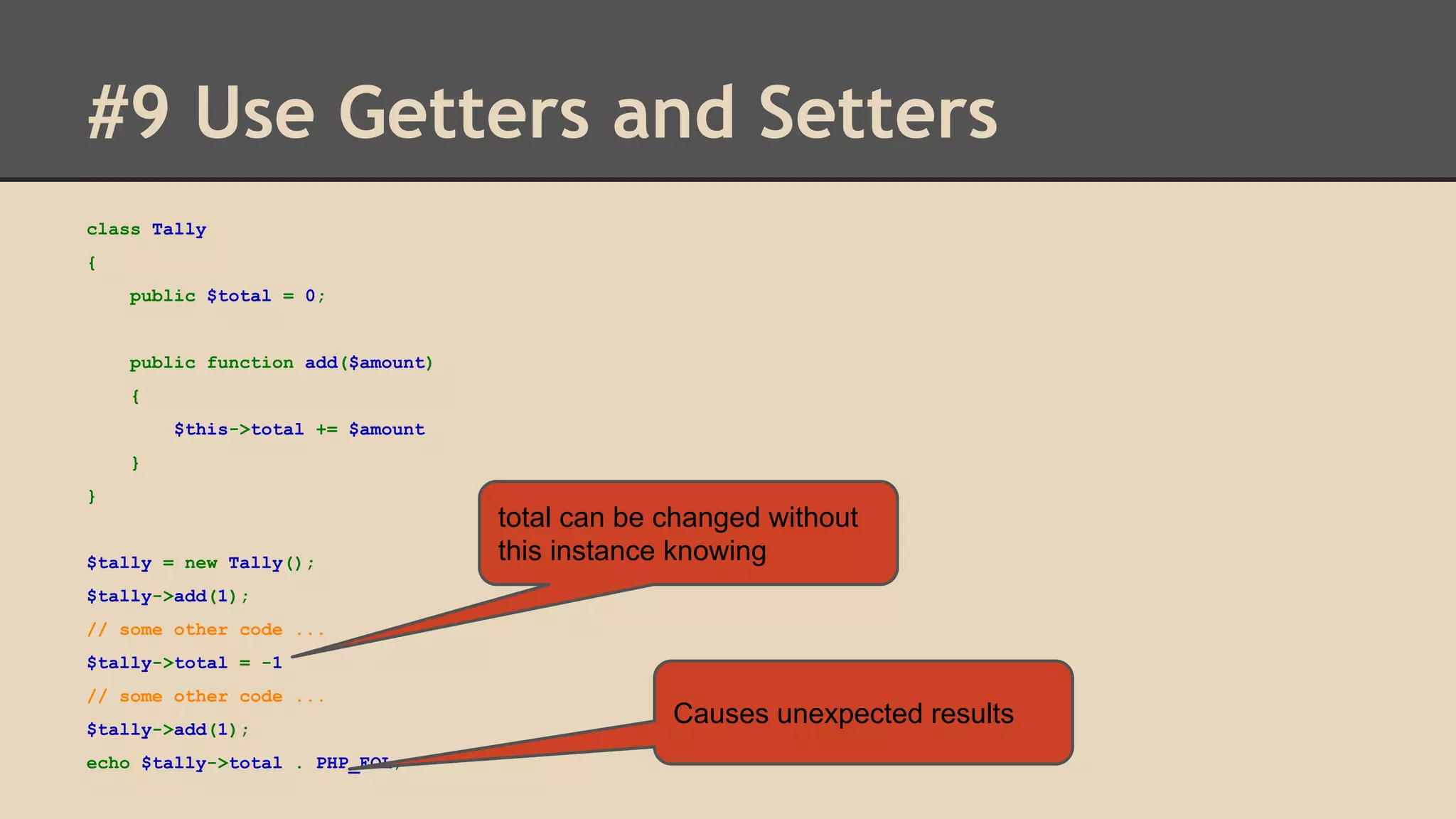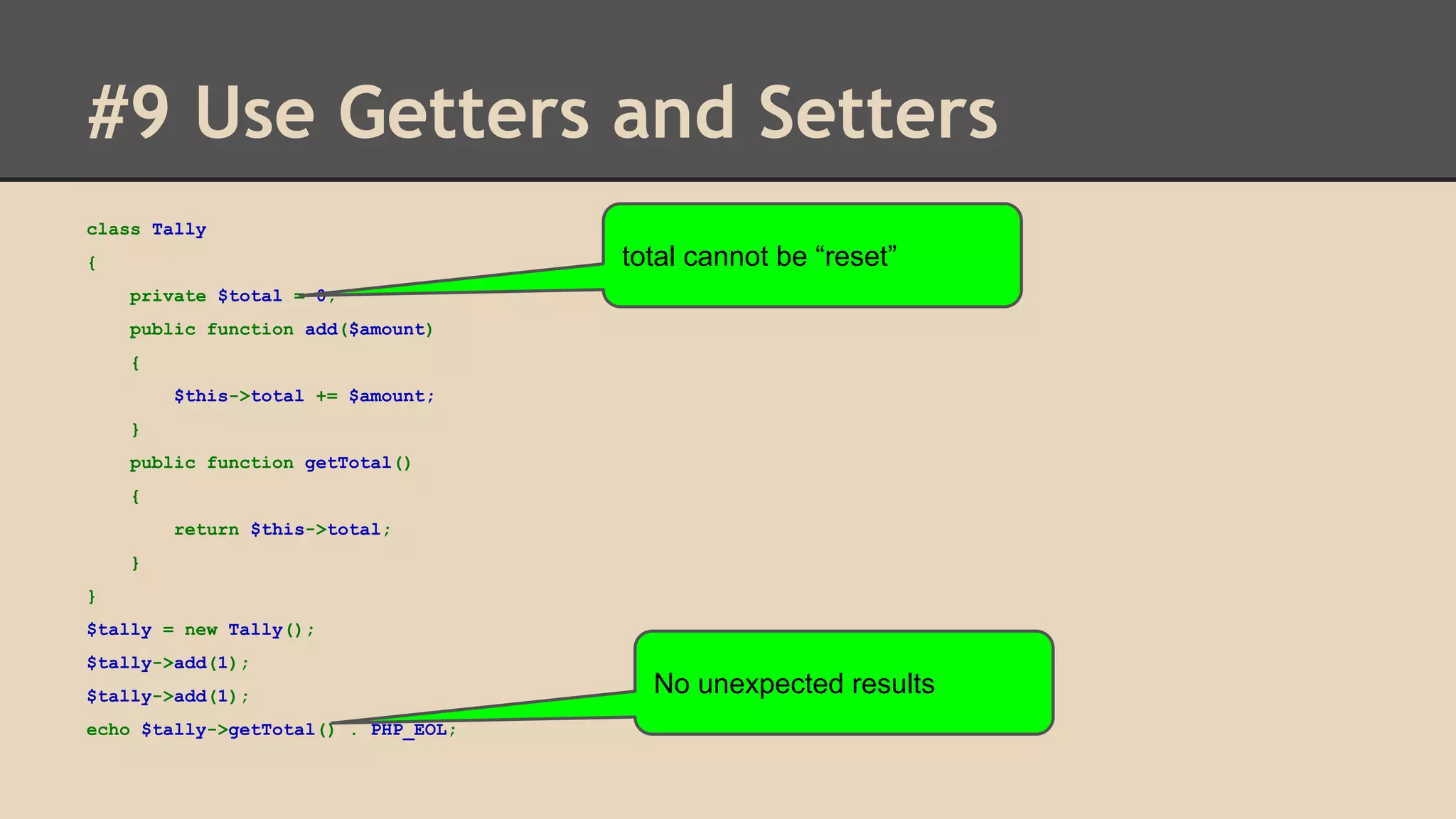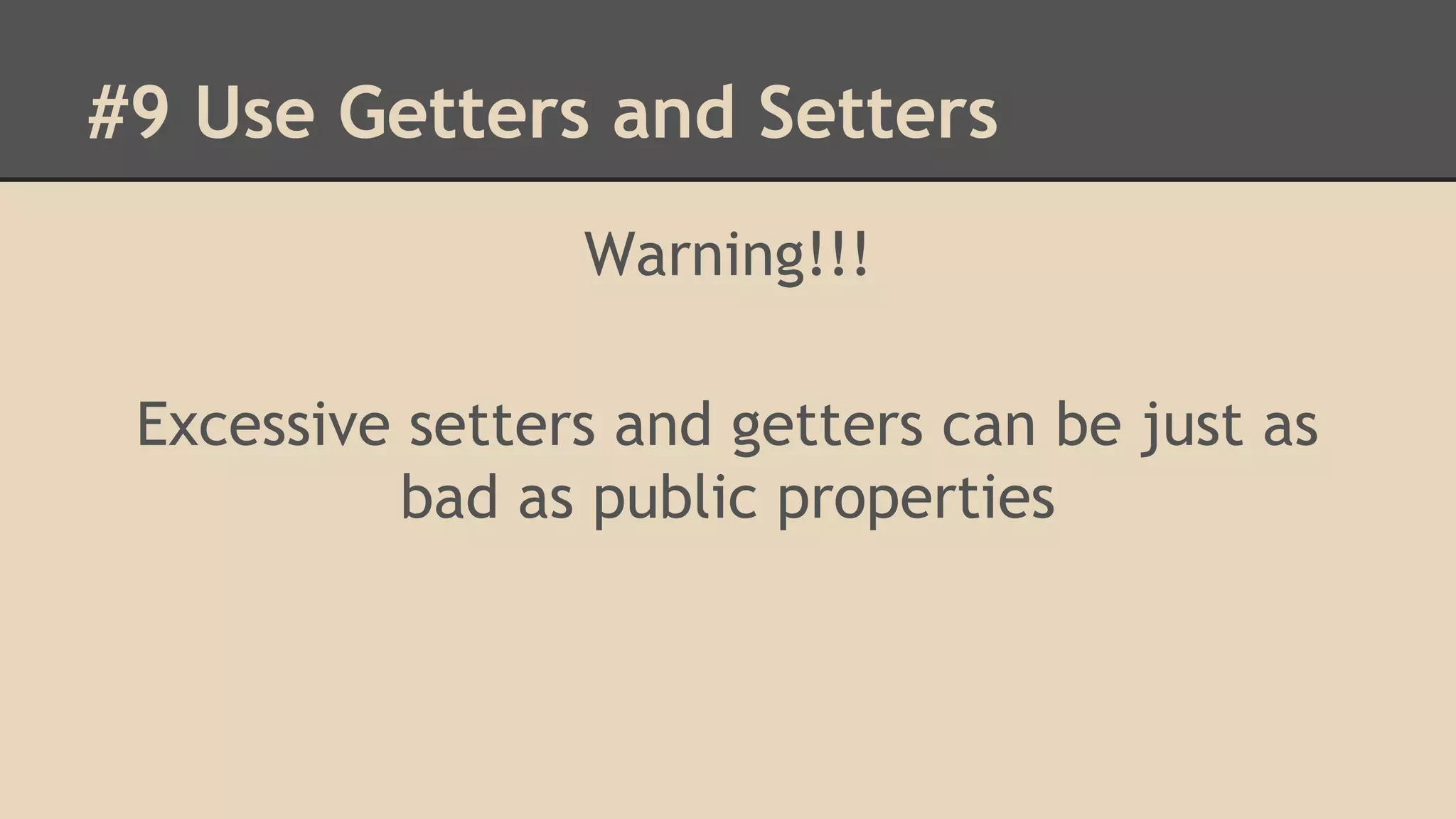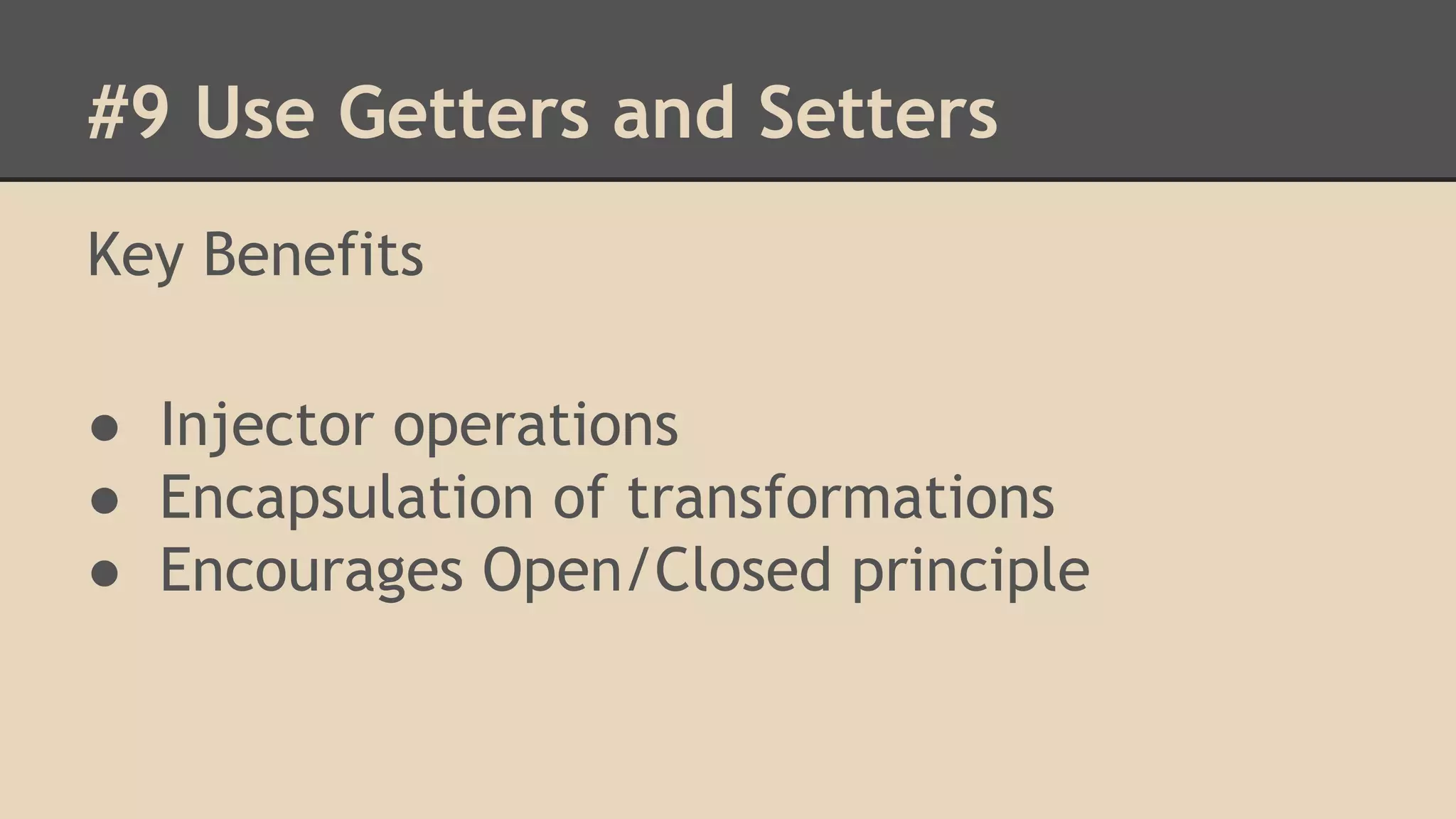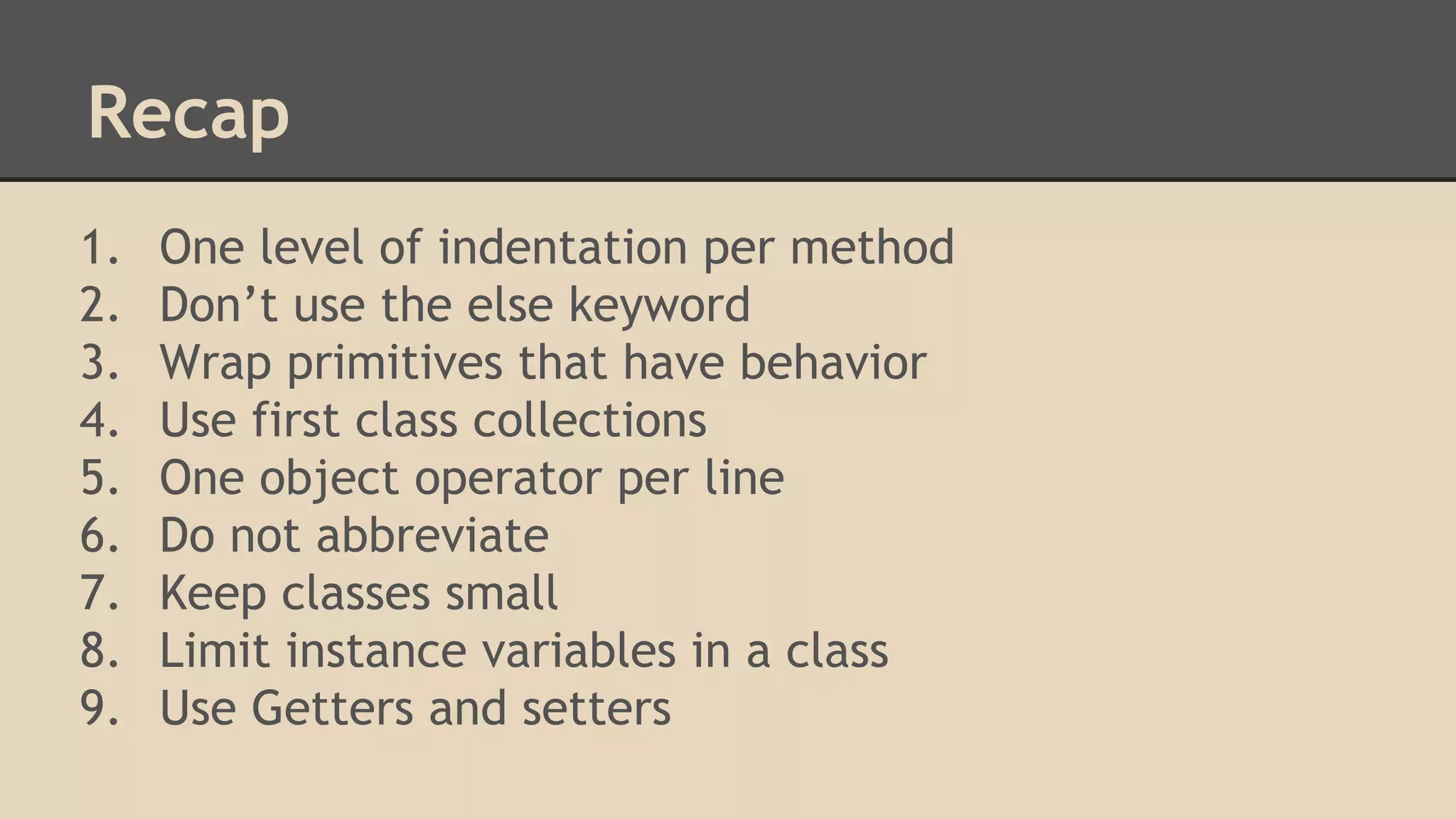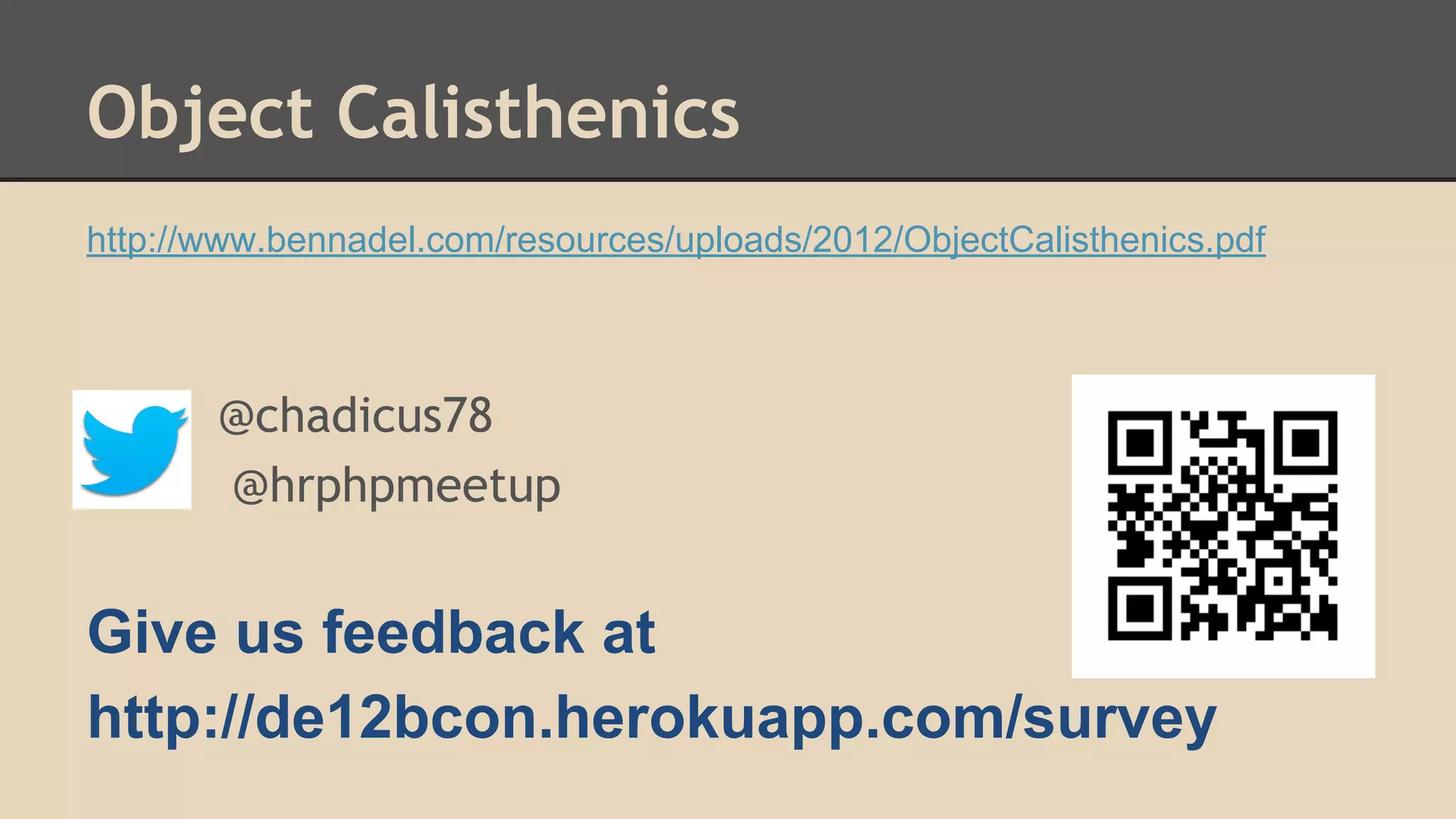The document discusses the concept of Object Calisthenics, which are programming guidelines aimed at writing better object-oriented code. It specifically outlines 9 guidelines/rules adapted for PHP programming: 1. Only one level of indentation per method. 2. Do not use the 'else' keyword. 3. Wrap all primitive data types and strings in objects. 4. Collections of objects should be first-class objects. 5. Only call one method on an object per line. 6. Do not abbreviate names. 7. Keep classes small with under 200 lines of code and 10 methods. 8. Limit the number of instance variables in a class to 2-5. 9
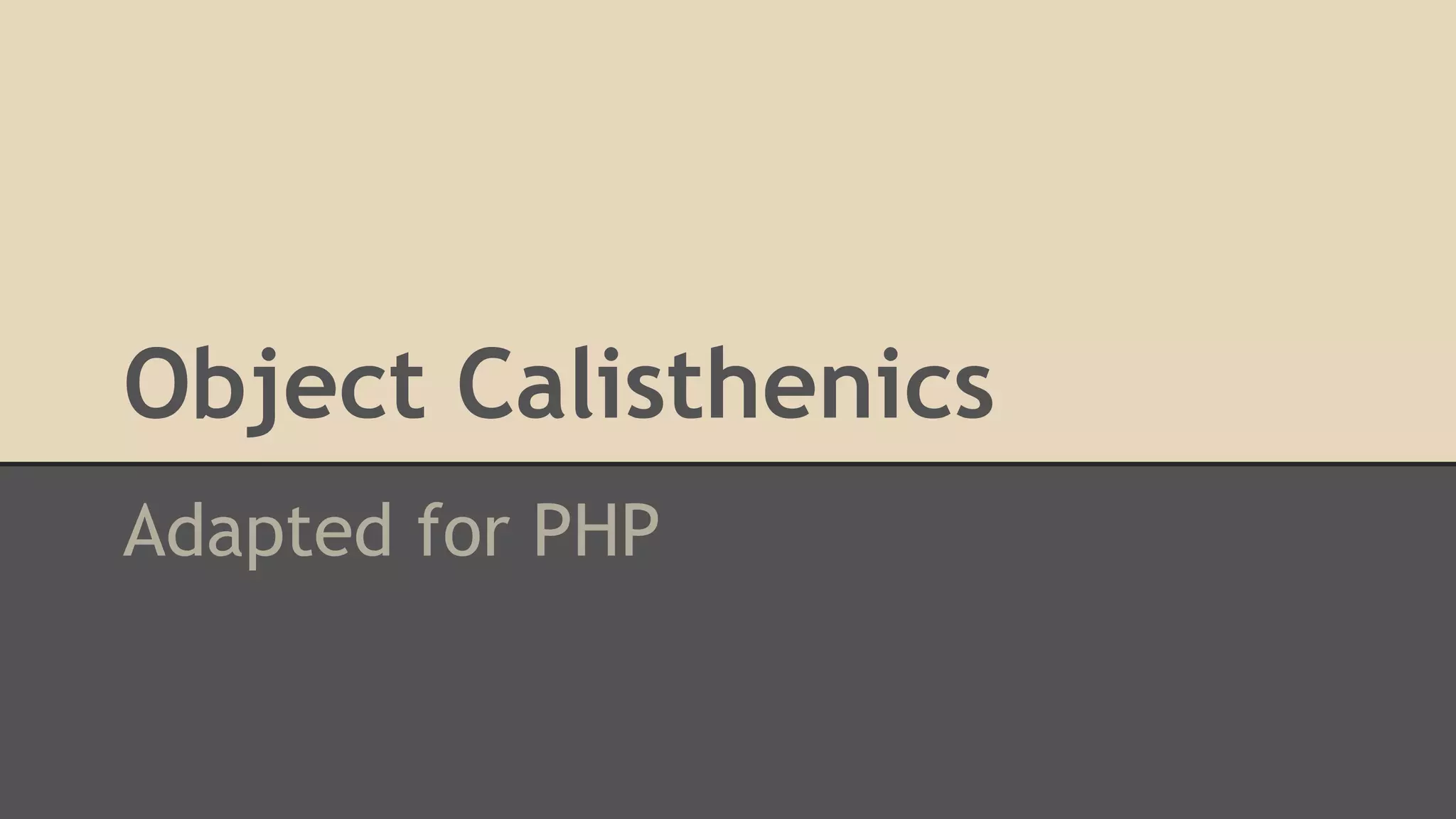

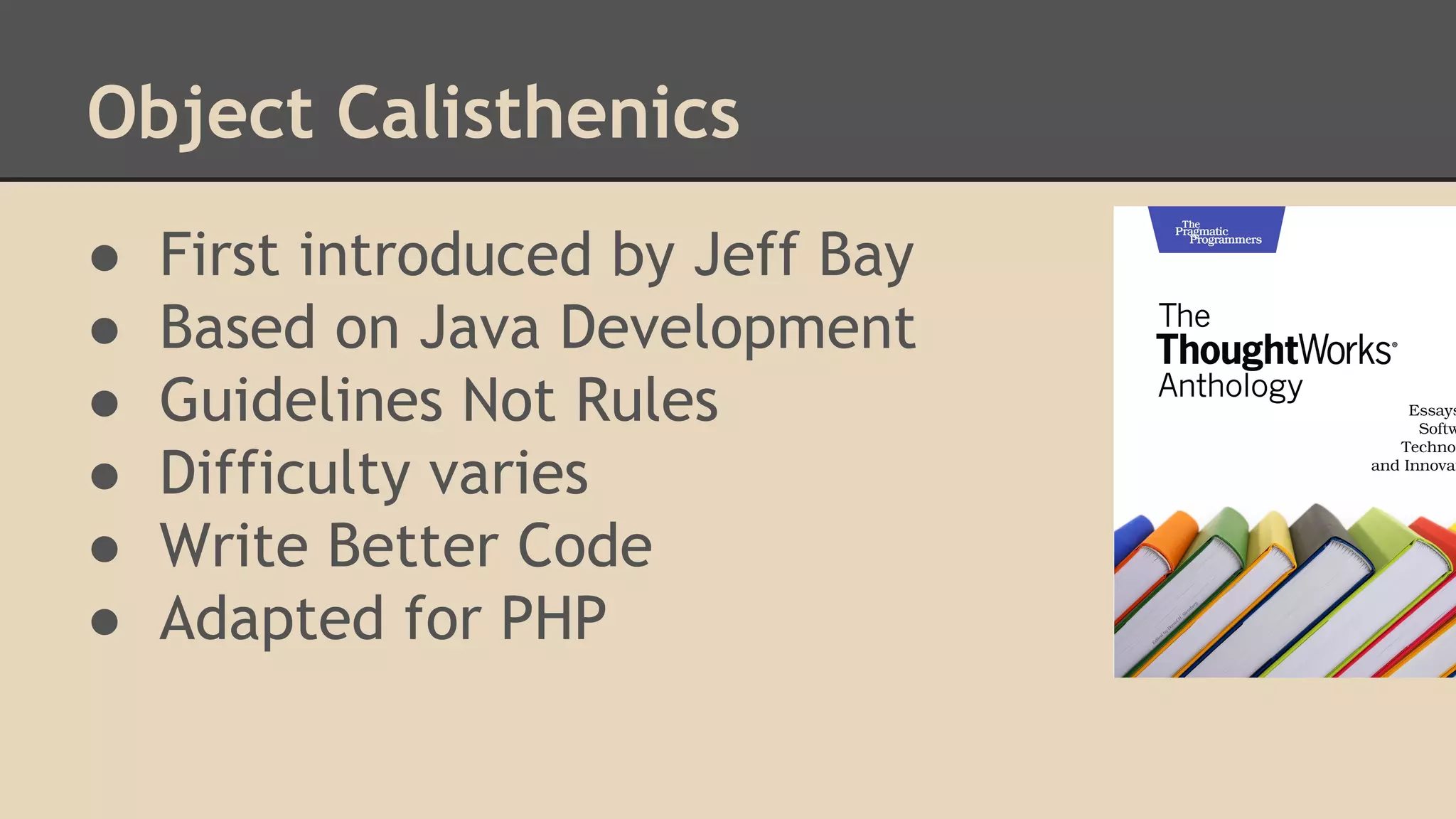
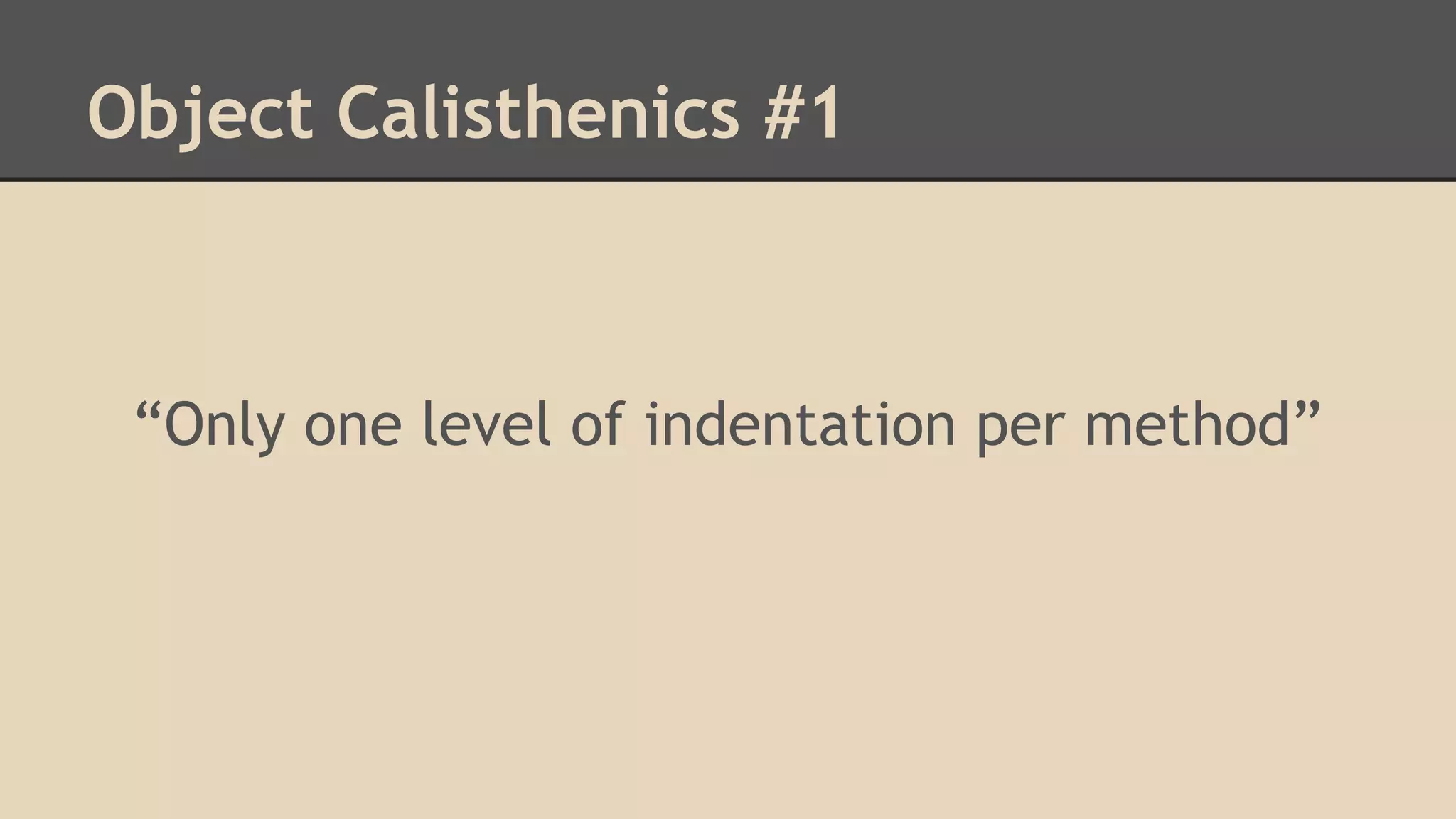
![#1 Only one level of indentation public function validate(array $products) { $requiredFields = ['price', 'name', 'description']; $valid = true; foreach ($products as $rawProduct) { $fields = array_keys($rawProduct); foreach ($requiredFields as $requiredField) { if (!in_array($requiredField, $fields)) { $valid = false; } } } return $valid; }](https://image.slidesharecdn.com/gettingyourcodeintoshape-131216084721-phpapp01/75/Object-Calisthenics-Adapted-for-PHP-5-2048.jpg)
![#1 Only one level of indentation public function validate(array $products) { $requiredFields = ['price', 'name', 'description']; $valid = true; 0 foreach ($products as $rawProduct) { 1 $fields = array_keys($rawProduct); foreach ($requiredFields as $requiredField) { 2 if (!in_array($requiredField, $fields)) { 3 $valid = false; } } } return $valid; }](https://image.slidesharecdn.com/gettingyourcodeintoshape-131216084721-phpapp01/75/Object-Calisthenics-Adapted-for-PHP-6-2048.jpg)
![#1 Only one level of indentation public function validate(array $products) { $requiredFields = ['price', 'name', 'description']; $valid = true; foreach ($products as $rawProduct) { $valid = $valid && $this->validateSingle($rawProduct, $requiredFields); } return $valid; } public function validateSingle(array $product, array $requiredFields) { $fields = array_keys($product); return count(array_diff($requiredFields, $fields)) == 0; }](https://image.slidesharecdn.com/gettingyourcodeintoshape-131216084721-phpapp01/75/Object-Calisthenics-Adapted-for-PHP-7-2048.jpg)
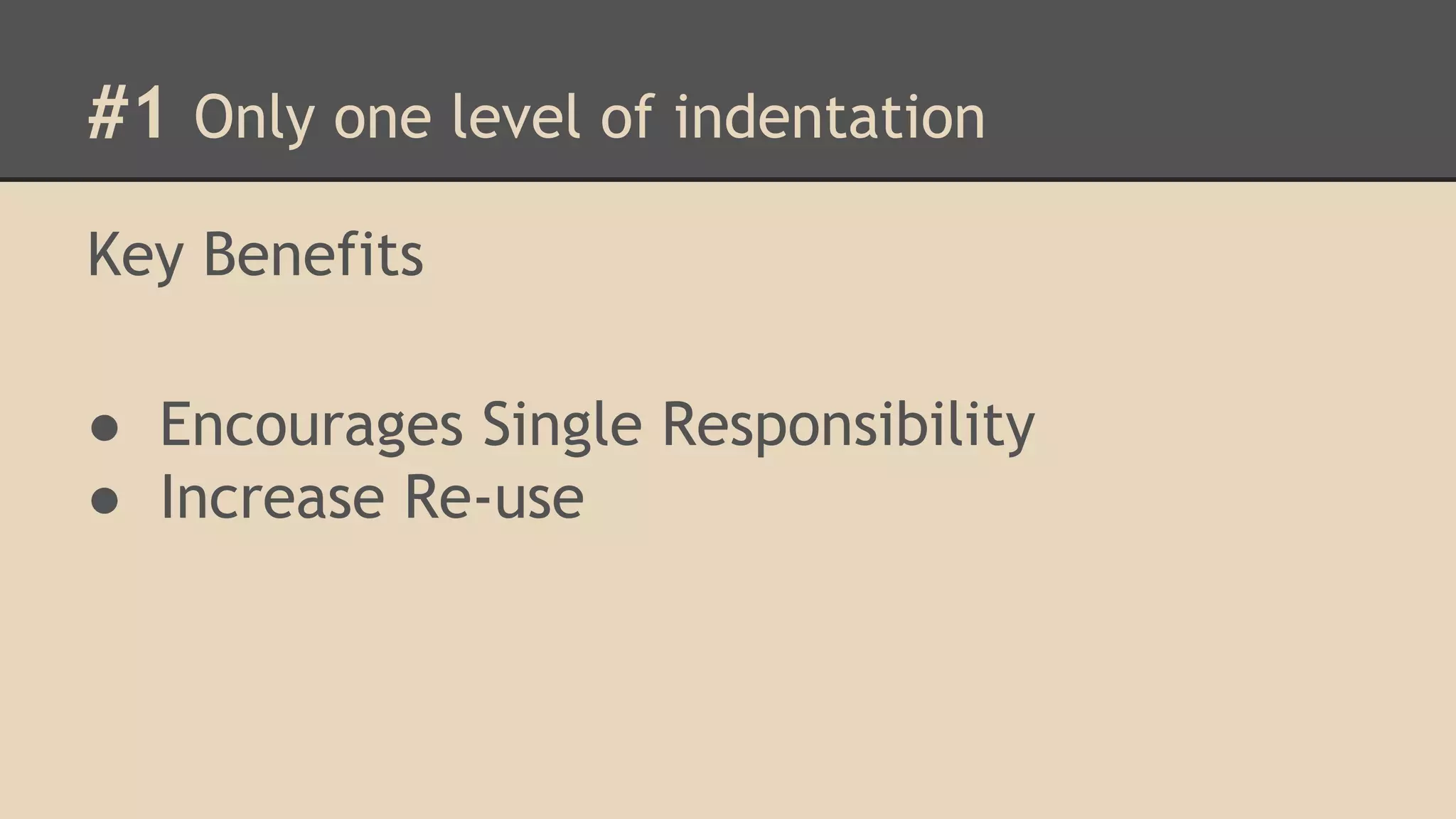
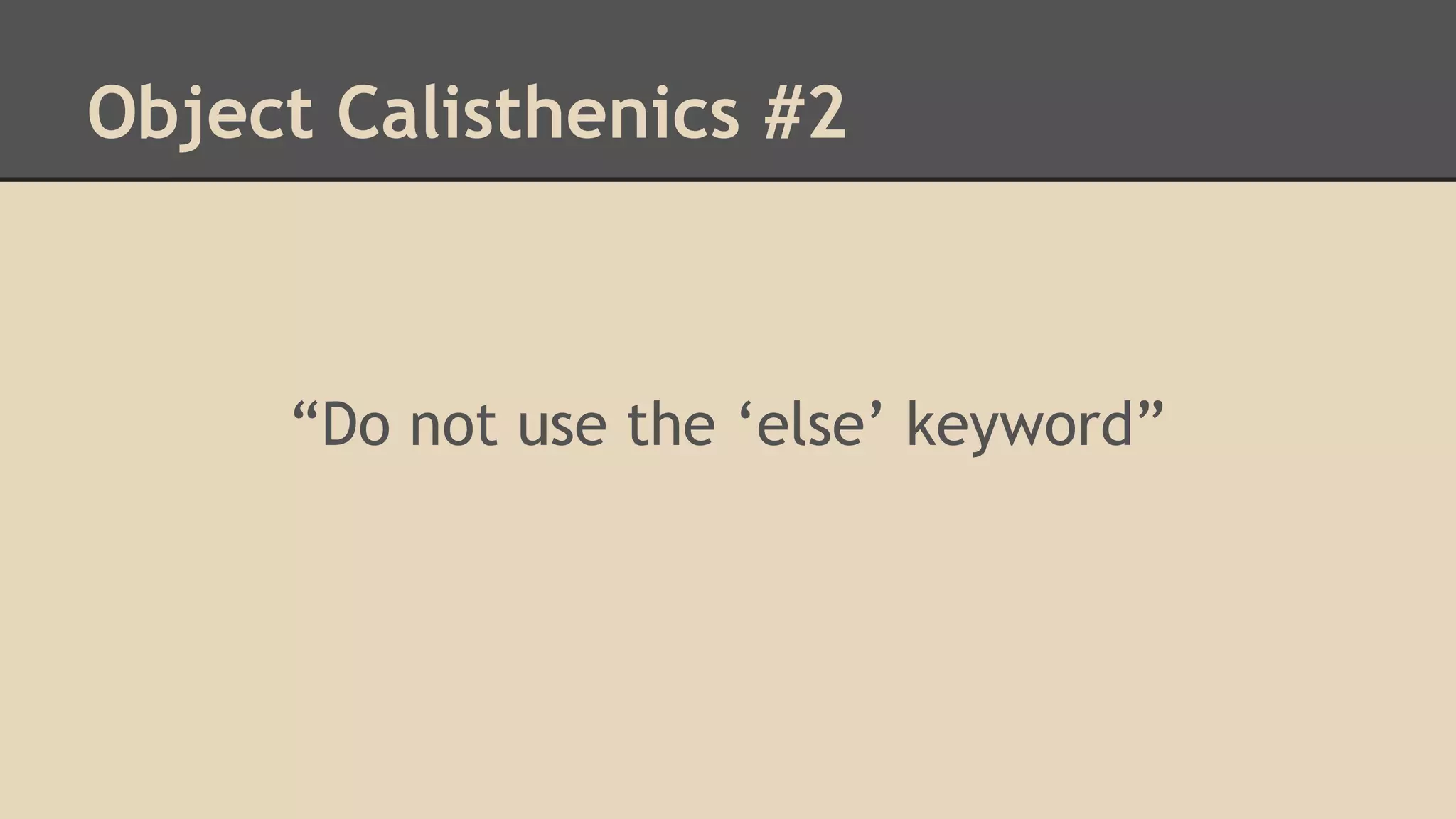
![#2 Do not use the ‘else’ keyword public function ensure($valueToEnsure, $valueToCheck, $exception = null, array $exceptionArgs = null) { if ($valueToEnsure === $valueToCheck) { return $valueToCheck; } if ($exception === null) { throw new Exception("'{$valueToEnsure}' did not equal '{$valueToCheck}'"); } elseif (is_string($exception)) { if ($exceptionArgs === null) { throw new Exception($exception); } else { if (array_key_exists($exception, self::$_exceptionAliases)) { $exception = self::$_exceptionAliases[$exception]; } $reflectionClass = new ReflectionClass($exception); throw $reflectionClass->newInstanceArgs($exceptionArgs); } } else { throw new InvalidArgumentException('$exception was not a string, Exception or null'); } }](https://image.slidesharecdn.com/gettingyourcodeintoshape-131216084721-phpapp01/75/Object-Calisthenics-Adapted-for-PHP-10-2048.jpg)
![#2 Do not use the ‘else’ keyword public function ensure($valueToEnsure, $valueToCheck, $exception = null, array $exceptionArgs = null) { if ($valueToEnsure === $valueToCheck) { return $valueToCheck; } if ($exception === null) { throw new Exception("'{$valueToEnsure}' did not equal '{$valueToCheck}'"); } elseif (is_string($exception)) { if ($exceptionArgs === null) { throw new Exception($exception); } else { if (array_key_exists($exception, self::$_exceptionAliases)) { $exception = self::$_exceptionAliases[$exception]; } $reflectionClass = new ReflectionClass($exception); throw $reflectionClass->newInstanceArgs($exceptionArgs); } } else { throw new InvalidArgumentException('$exception was not a string, Exception or null'); } }](https://image.slidesharecdn.com/gettingyourcodeintoshape-131216084721-phpapp01/75/Object-Calisthenics-Adapted-for-PHP-11-2048.jpg)
![#2 Do not use the ‘else’ keyword public function ensure($valueToEnsure, $valueToCheck, $exception = null, array $exceptionArgs = null) { if ($valueToEnsure === $valueToCheck) { return $valueToCheck; } if ($exception === null) { throw new Exception("'{$valueToEnsure}' did not equal '{$valueToCheck}'"); } elseif (is_string($exception)) { if ($exceptionArgs === null) { throw new Exception($exception); } else { if (array_key_exists($exception, self::$_exceptionAliases)) { $exception = self::$_exceptionAliases[$exception]; } $reflectionClass = new ReflectionClass($exception); throw $reflectionClass->newInstanceArgs($exceptionArgs); } } else { throw new InvalidArgumentException('$exception was not a string, Exception or null'); } }](https://image.slidesharecdn.com/gettingyourcodeintoshape-131216084721-phpapp01/75/Object-Calisthenics-Adapted-for-PHP-12-2048.jpg)
![#2 Do not use the ‘else’ keyword public function ensure($valueToEnsure, $valueToCheck, $exception = null, array $exceptionArgs = null) { if ($valueToEnsure === $valueToCheck) { return $valueToCheck; } if ($exception === null) { return early throw new Exception("'{$valueToEnsure}' did not equal '{$valueToCheck}'"); } elseif (is_string($exception)) { if ($exceptionArgs === null) { throw new Exception($exception); } else { if (array_key_exists($exception, self::$_exceptionAliases)) { $exception = self::$_exceptionAliases[$exception]; } $reflectionClass = new ReflectionClass($exception); throw $reflectionClass->newInstanceArgs($exceptionArgs); } } else { throw new InvalidArgumentException('$exception was not a string, Exception or null'); } }](https://image.slidesharecdn.com/gettingyourcodeintoshape-131216084721-phpapp01/75/Object-Calisthenics-Adapted-for-PHP-13-2048.jpg)
![#2 Do not use the ‘else’ keyword public function ensure($valueToEnsure, $valueToCheck, $exception = null, array $exceptionArgs = null) { if ($valueToEnsure === $valueToCheck) { return $valueToCheck; } if ($exception === null) { throw new Exception("'{$valueToEnsure}' did not equal '{$valueToCheck}'"); } if (is_string($exception)) { if ($exceptionArgs === null) { throw new Exception($exception); } else { if (array_key_exists($exception, self::$_exceptionAliases)) { $exception = self::$_exceptionAliases[$exception]; } $reflectionClass = new ReflectionClass($exception); throw $reflectionClass->newInstanceArgs($exceptionArgs); } } else { throw new InvalidArgumentException('$exception was not a string, Exception or null'); }](https://image.slidesharecdn.com/gettingyourcodeintoshape-131216084721-phpapp01/75/Object-Calisthenics-Adapted-for-PHP-14-2048.jpg)
![#2 Do not use the ‘else’ keyword public function ensure($valueToEnsure, $valueToCheck, $exception = null, array $exceptionArgs = null) { if ($valueToEnsure === $valueToCheck) { return $valueToCheck; } if ($exception === null) { throw new Exception("'{$valueToEnsure}' did not equal '{$valueToCheck}'"); reverse condition } if (is_string($exception)) { if ($exceptionArgs === null) { throw new Exception($exception); } else { if (array_key_exists($exception, self::$_exceptionAliases)) { $exception = self::$_exceptionAliases[$exception]; } $reflectionClass = new ReflectionClass($exception); throw $reflectionClass->newInstanceArgs($exceptionArgs); } } else { throw new InvalidArgumentException('$exception was not a string, Exception or null'); }](https://image.slidesharecdn.com/gettingyourcodeintoshape-131216084721-phpapp01/75/Object-Calisthenics-Adapted-for-PHP-15-2048.jpg)
![#2 Do not use the ‘else’ keyword public function ensure($valueToEnsure, $valueToCheck, $exception = null, array $exceptionArgs = null) { if ($valueToEnsure === $valueToCheck) { return $valueToCheck; } if ($exception === null) { throw new Exception("'{$valueToEnsure}' did not equal '{$valueToCheck}'"); } if (!is_string($exception)) { throw new InvalidArgumentException('$exception was not a string, Exception or null'); } if ($exceptionArgs === null) { throw new Exception($exception); } else { if (array_key_exists($exception, self::$_exceptionAliases)) { $exception = self::$_exceptionAliases[$exception]; } $reflectionClass = new ReflectionClass($exception); throw $reflectionClass->newInstanceArgs($exceptionArgs); } }](https://image.slidesharecdn.com/gettingyourcodeintoshape-131216084721-phpapp01/75/Object-Calisthenics-Adapted-for-PHP-16-2048.jpg)
![#2 Do not use the ‘else’ keyword public function ensure($valueToEnsure, $valueToCheck, $exception = null, array $exceptionArgs = null) { if ($valueToEnsure === $valueToCheck) { return $valueToCheck; } if ($exception === null) { throw new Exception("'{$valueToEnsure}' did not equal '{$valueToCheck}'"); } if (!is_string($exception)) { throw new InvalidArgumentException('$exception was not a string, Exception or null'); } if ($exceptionArgs === null) { throw new Exception($exception); } else { if (array_key_exists($exception, self::$_exceptionAliases)) { $exception = self::$_exceptionAliases[$exception]; } $reflectionClass = new ReflectionClass($exception); throw $reflectionClass->newInstanceArgs($exceptionArgs); } } return early](https://image.slidesharecdn.com/gettingyourcodeintoshape-131216084721-phpapp01/75/Object-Calisthenics-Adapted-for-PHP-17-2048.jpg)
![#2 Do not use the ‘else’ keyword public function ensure($valueToEnsure, $valueToCheck, $exception = null, array $exceptionArgs = null) { if ($valueToEnsure === $valueToCheck) { return $valueToCheck; } if ($exception === null) { throw new Exception("'{$valueToEnsure}' did not equal '{$valueToCheck}'"); } if (!is_string($exception)) { throw new InvalidArgumentException('$exception was not a string, Exception or null'); } if ($exceptionArgs === null) { throw new Exception($exception); } if (array_key_exists($exception, self::$_exceptionAliases)) { $exception = self::$_exceptionAliases[$exception]; } $reflectionClass = new ReflectionClass($exception); throw $reflectionClass->newInstanceArgs($exceptionArgs); }](https://image.slidesharecdn.com/gettingyourcodeintoshape-131216084721-phpapp01/75/Object-Calisthenics-Adapted-for-PHP-18-2048.jpg)
![#2 Do not use the ‘else’ keyword public function ensure($valueToEnsure, $valueToCheck, $exception = null, array $exceptionArgs = null) { if ($valueToEnsure === $valueToCheck) { return $valueToCheck; } if ($exception === null) { throw new Exception("'{$valueToEnsure}' did not equal '{$valueToCheck}'"); } if (!is_string($exception)) { throw new InvalidArgumentException('$exception was not a string, Exception or null'); } if ($exceptionArgs === null) { throw new Exception($exception); } if (array_key_exists($exception, self::$_exceptionAliases)) { $exception = self::$_exceptionAliases[$exception]; } $reflectionClass = new ReflectionClass($exception); throw $reflectionClass->newInstanceArgs($exceptionArgs); }](https://image.slidesharecdn.com/gettingyourcodeintoshape-131216084721-phpapp01/75/Object-Calisthenics-Adapted-for-PHP-19-2048.jpg)
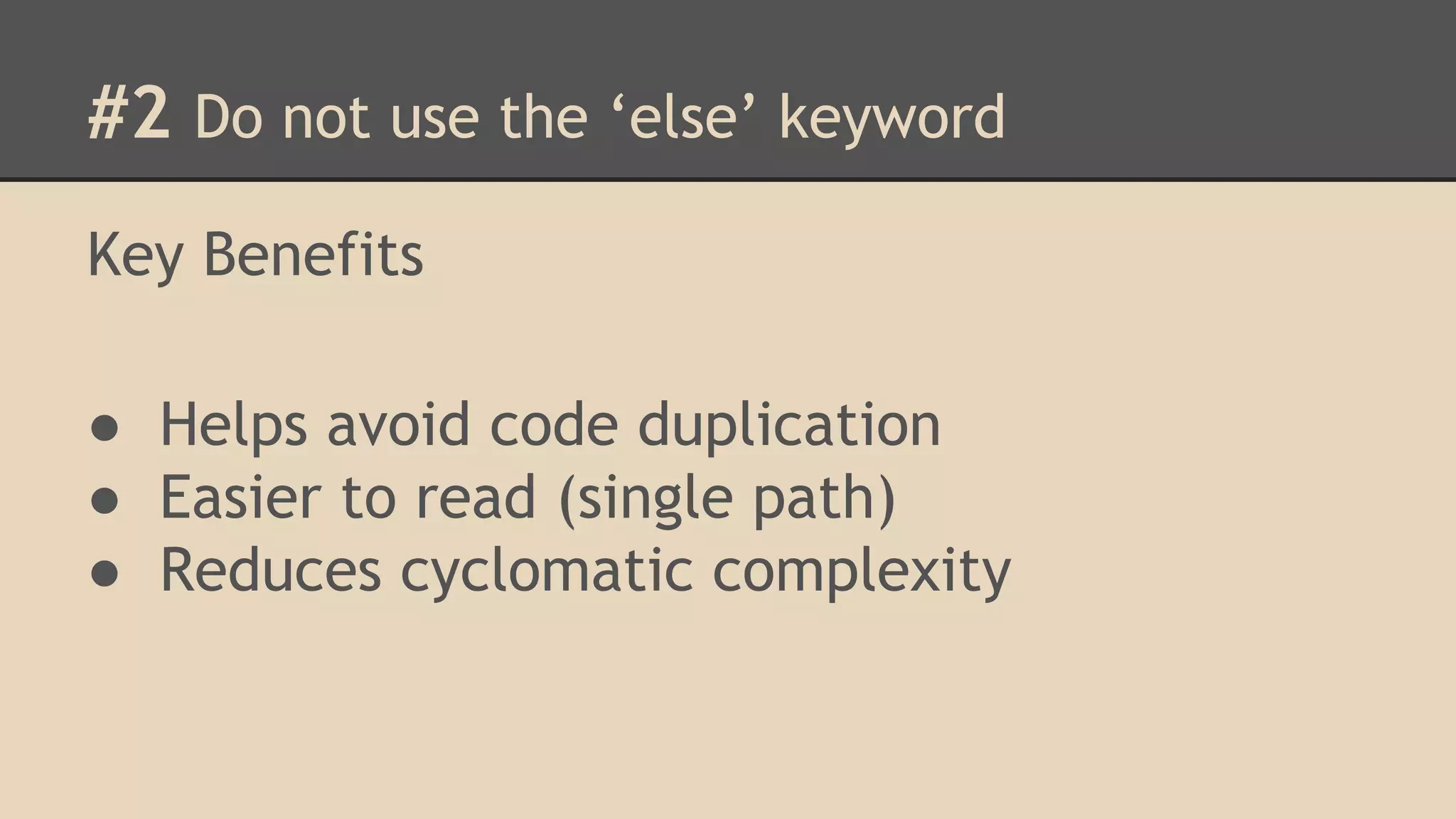
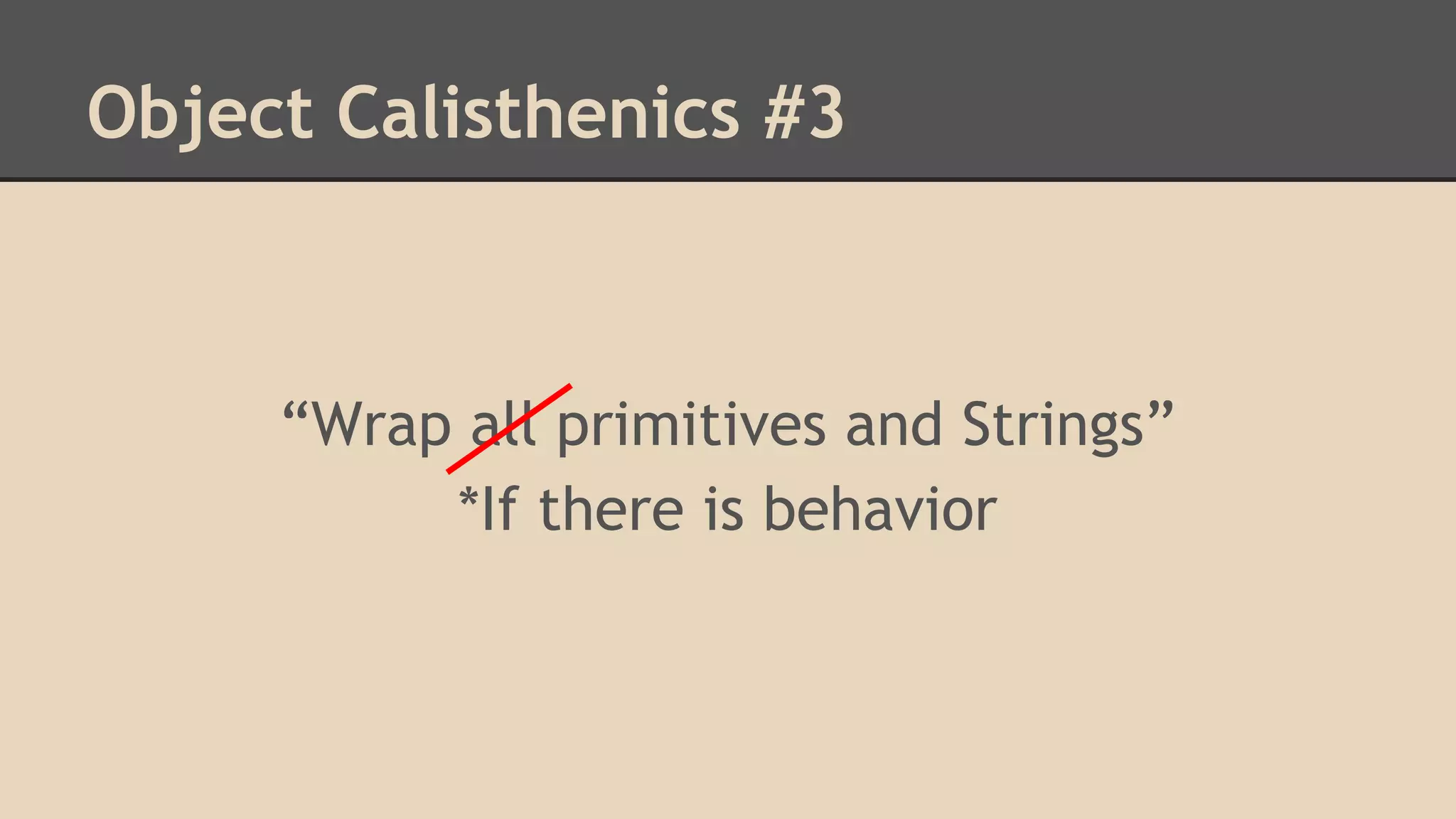
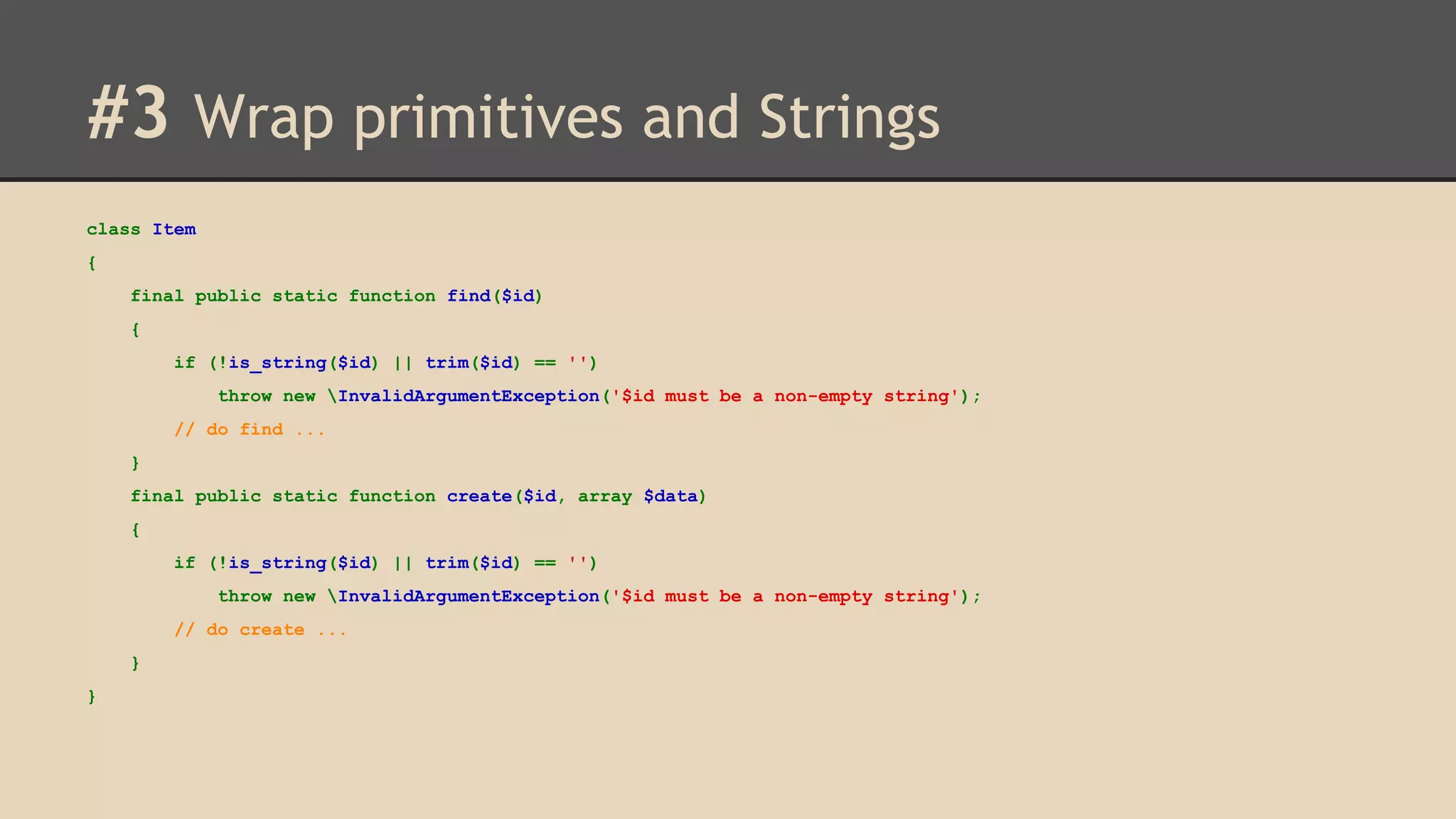
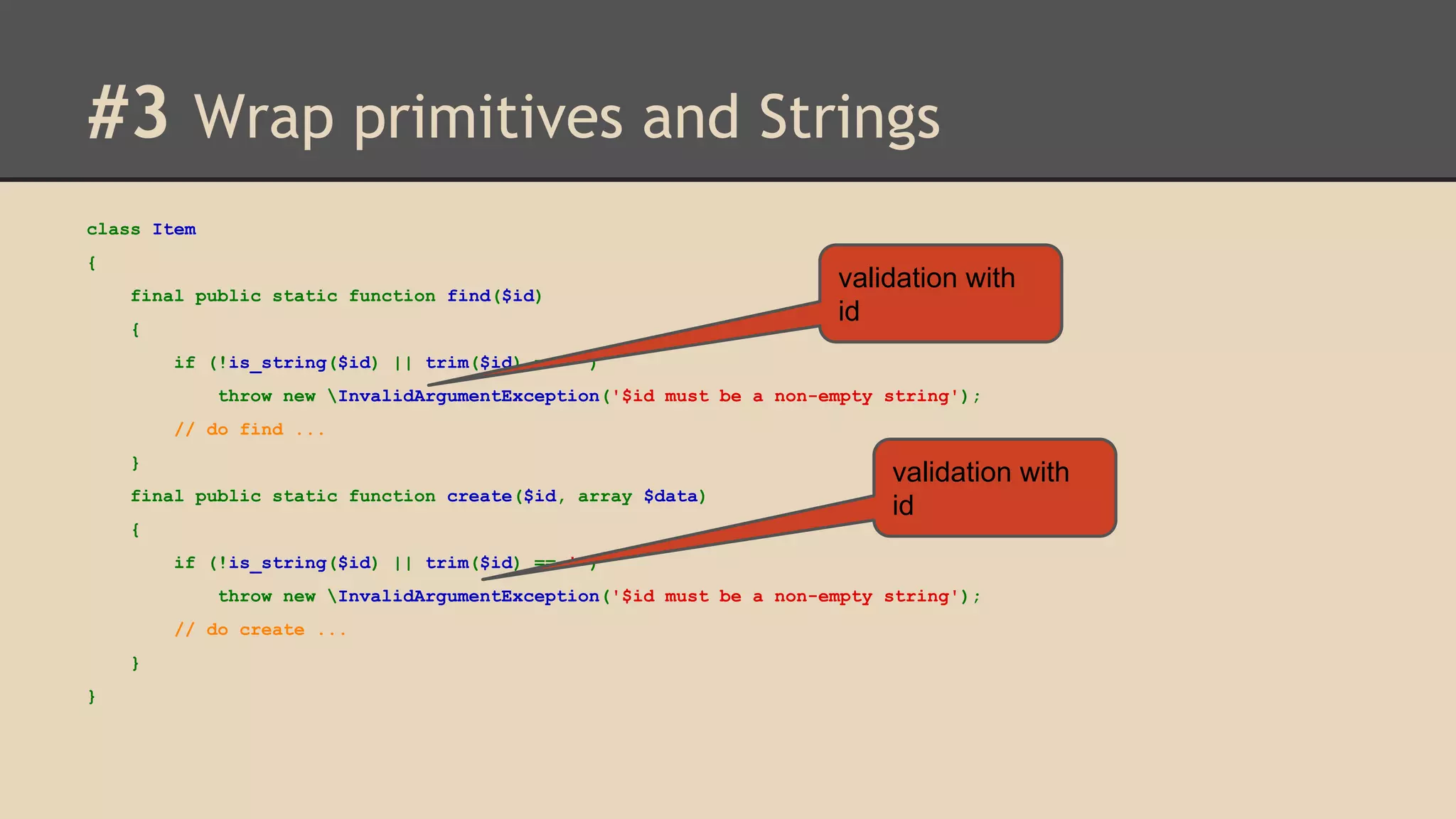
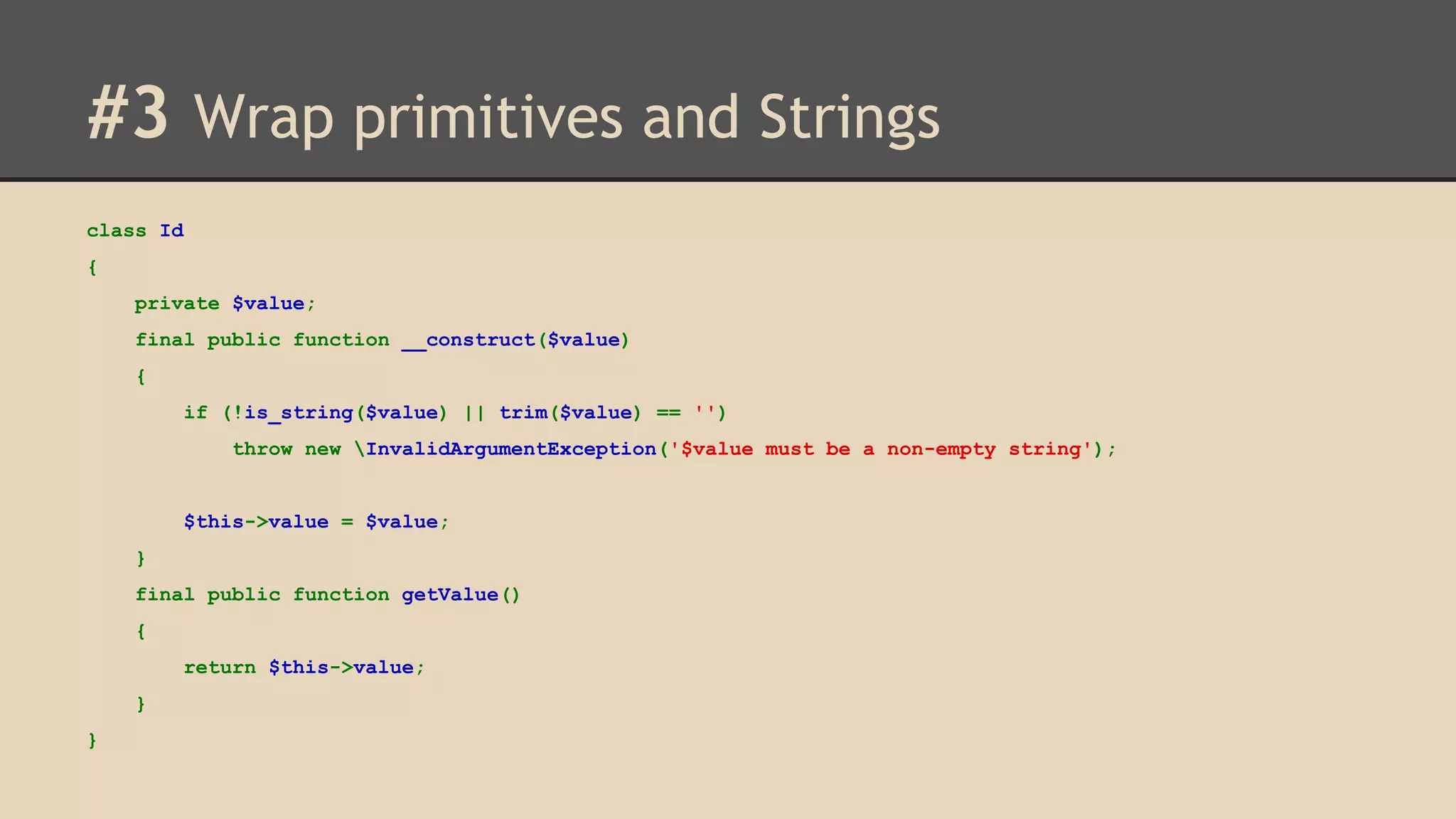
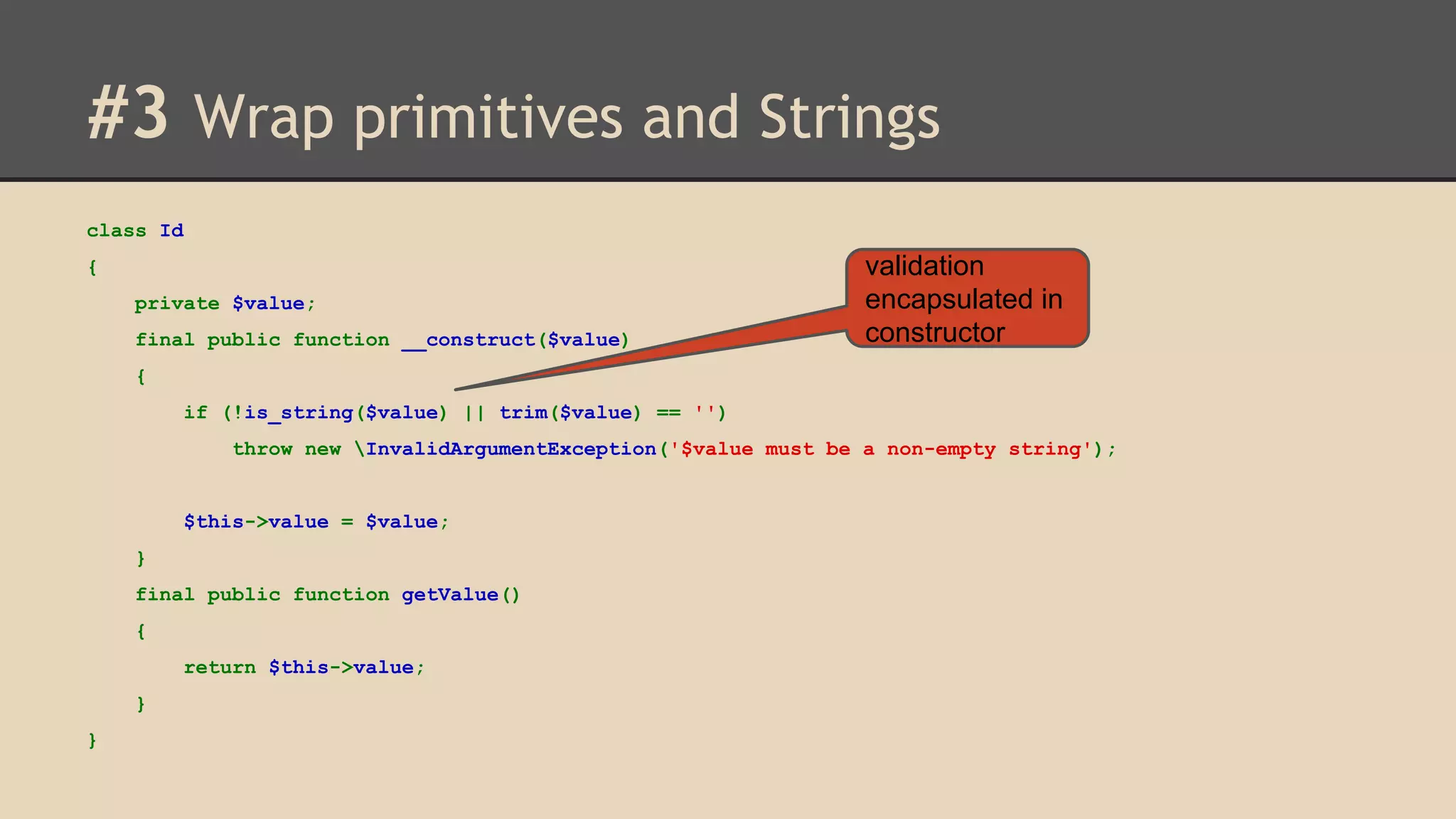
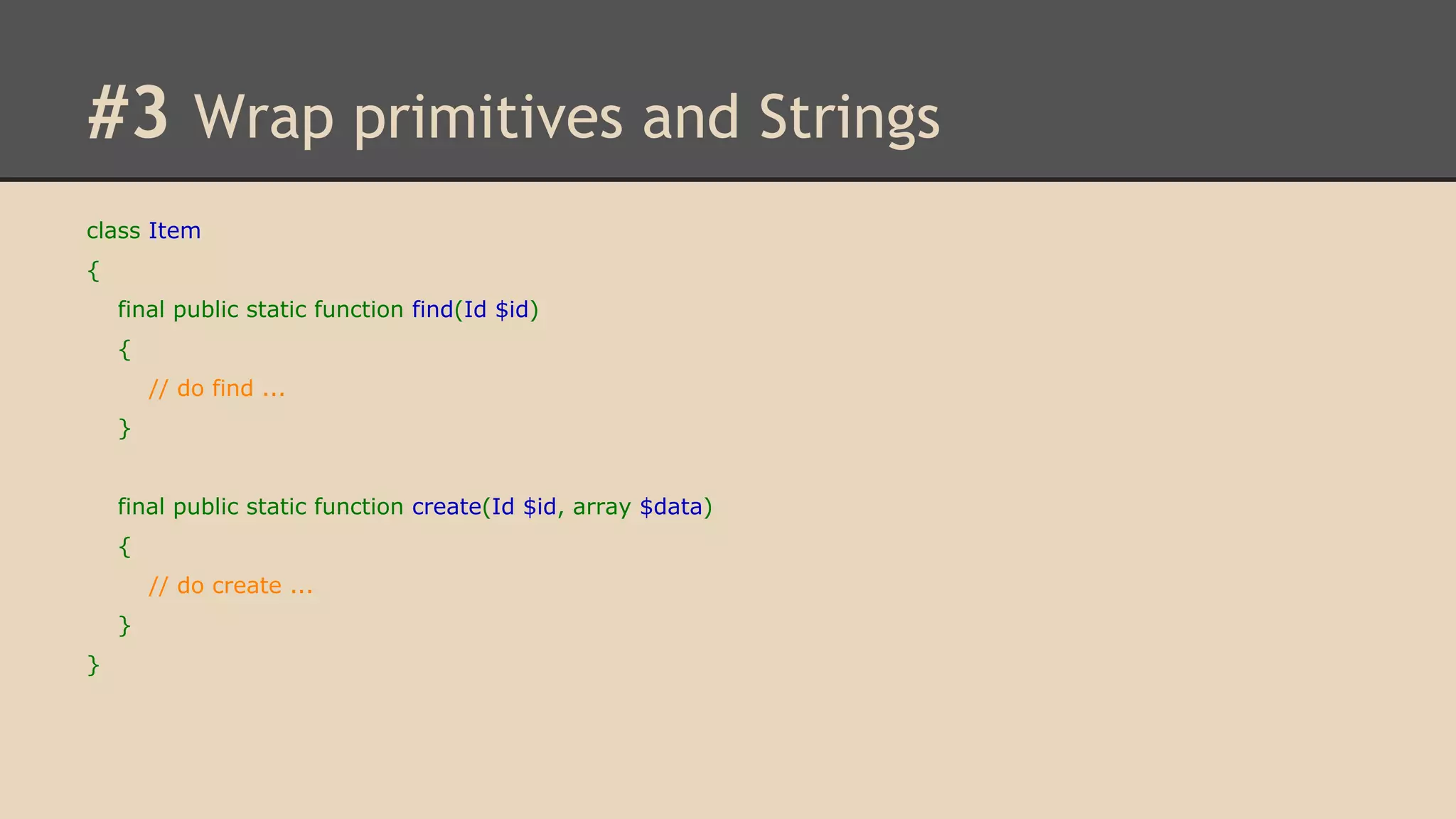
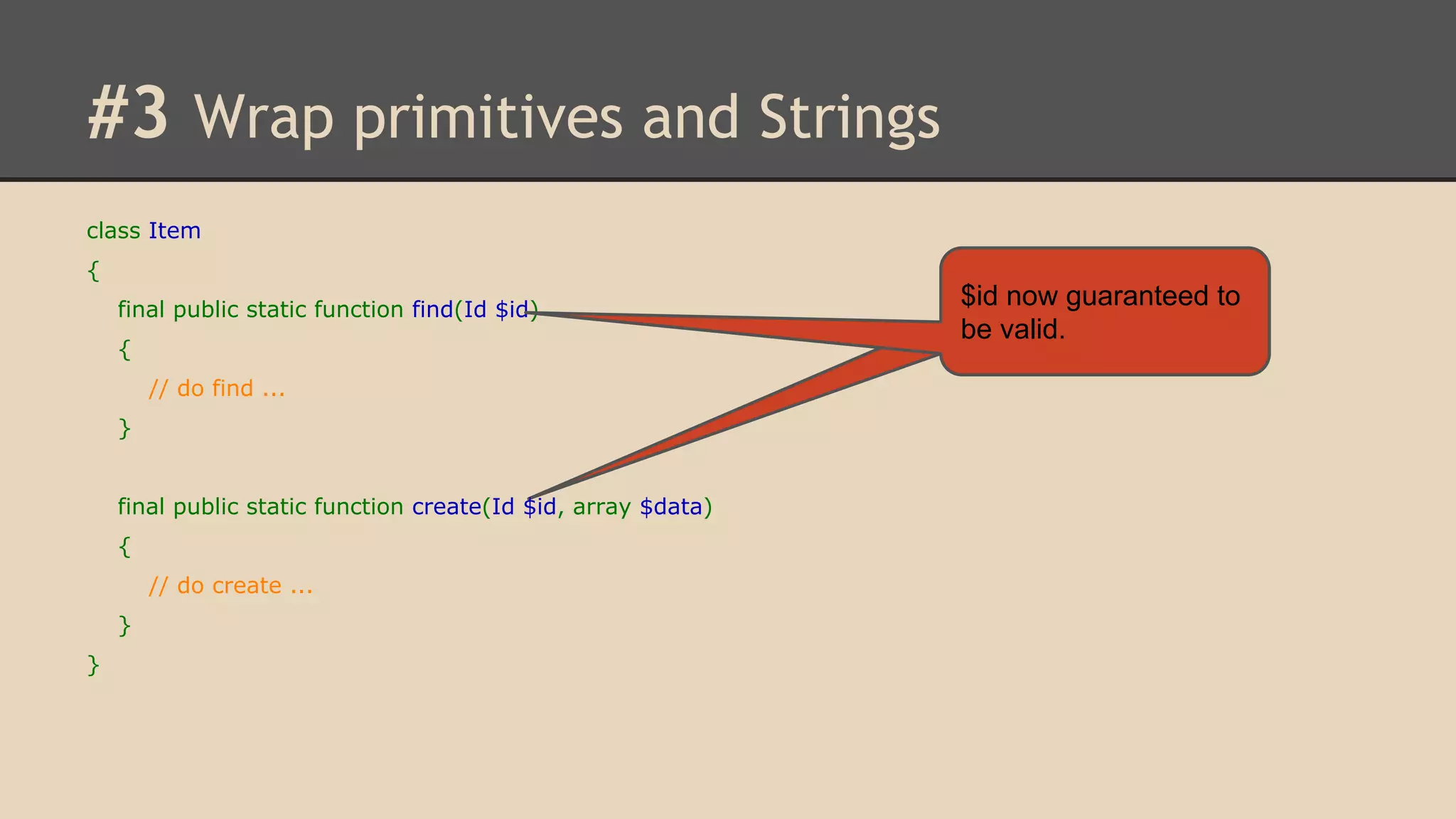
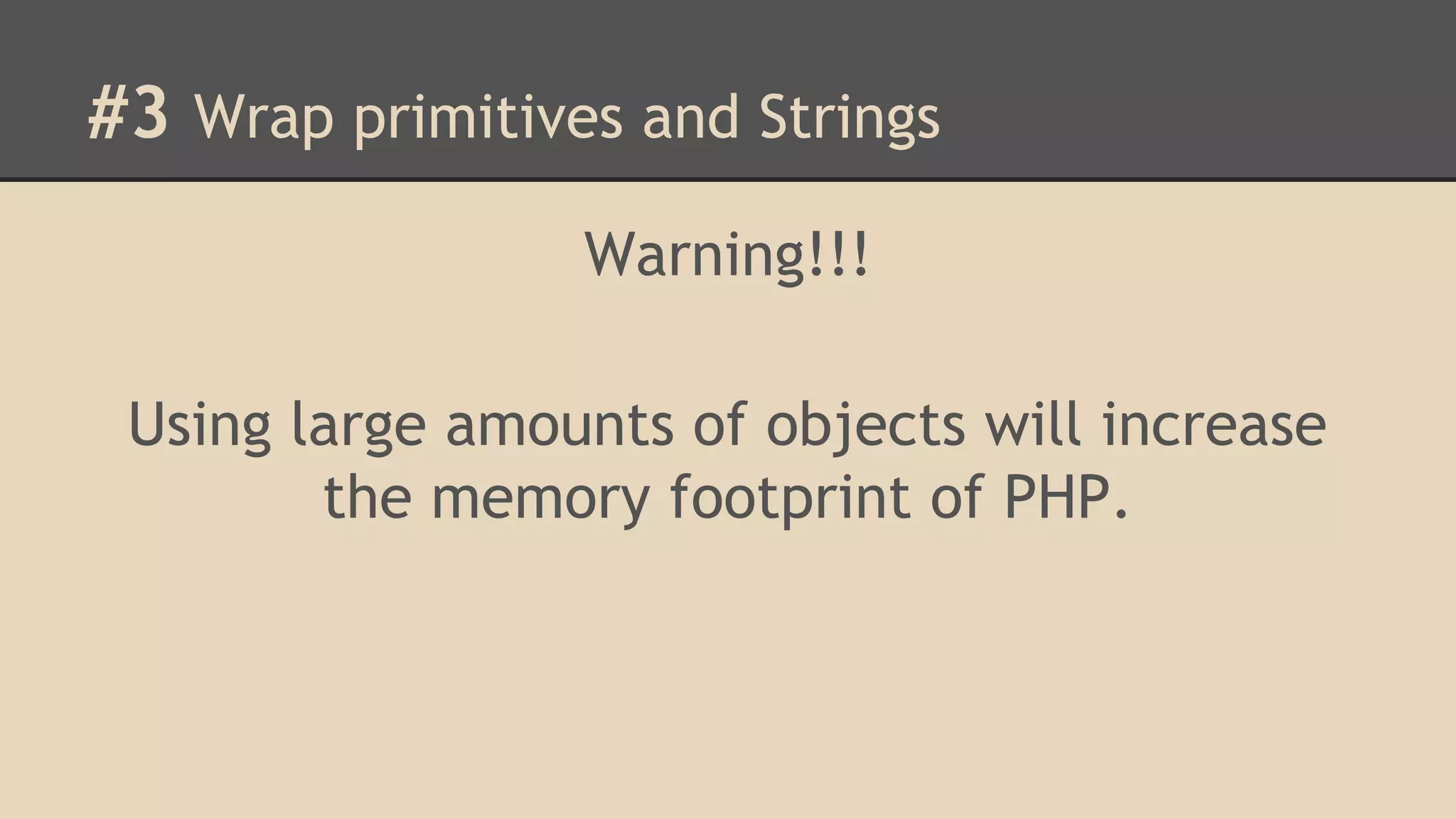
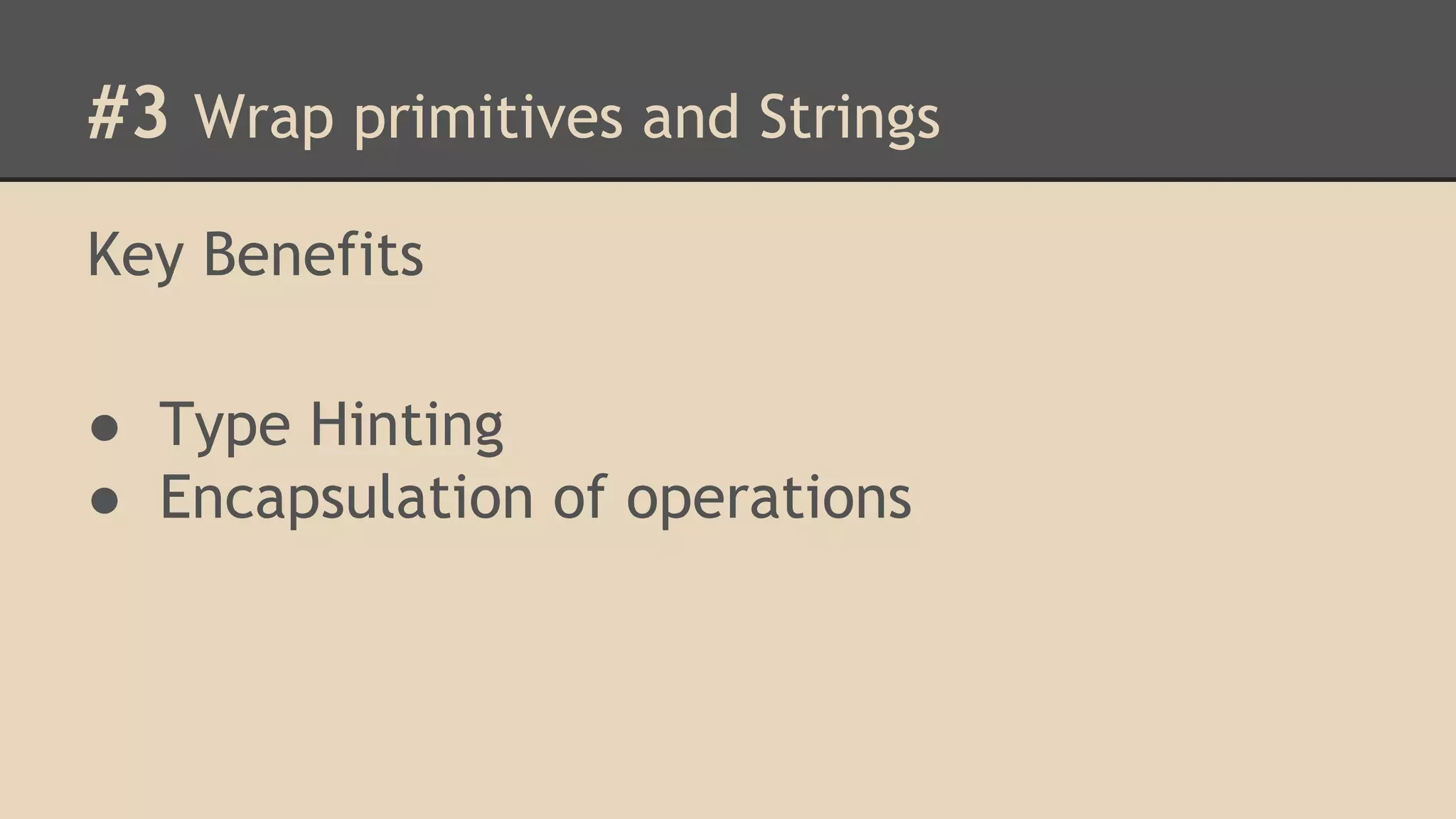
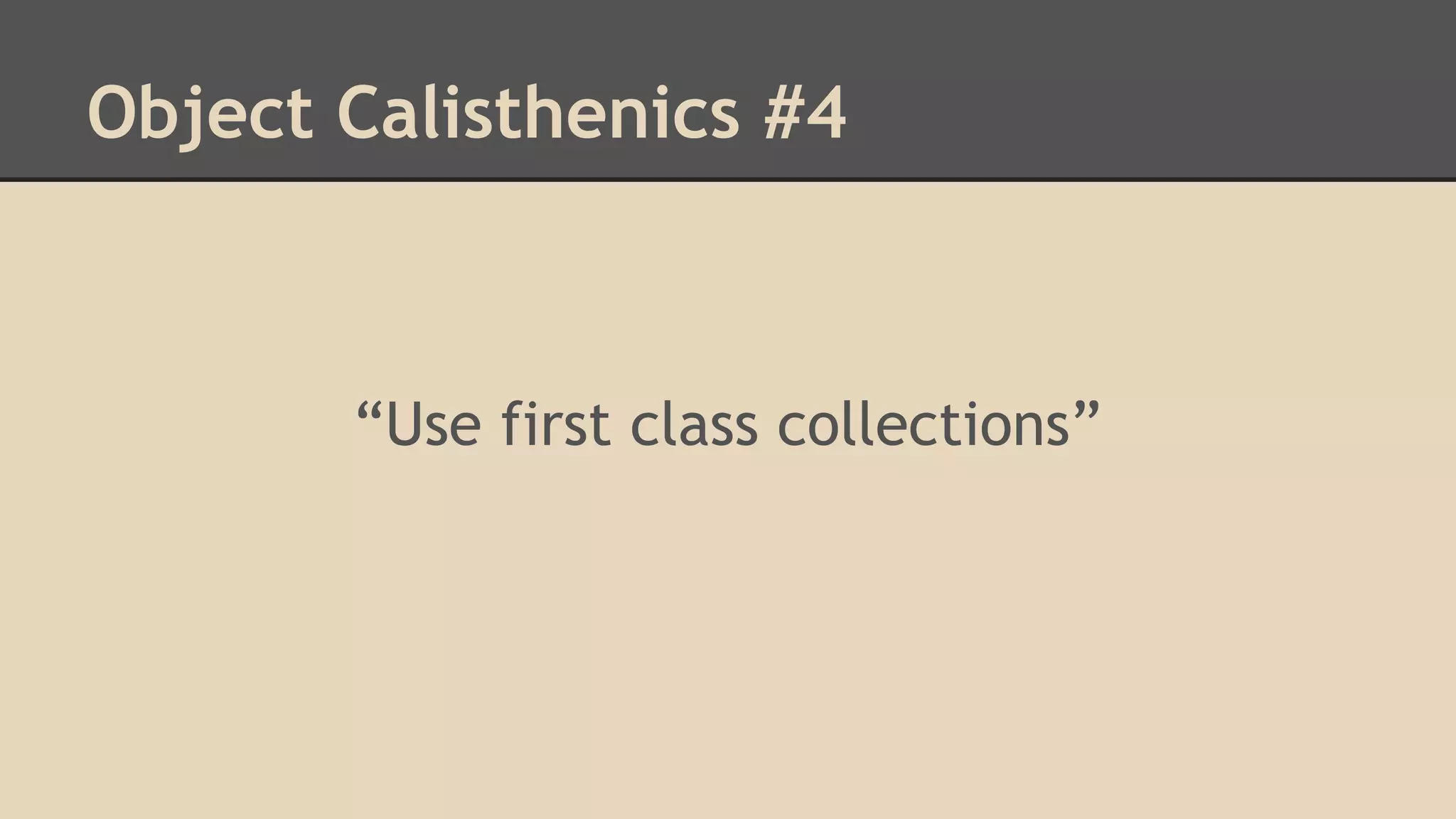
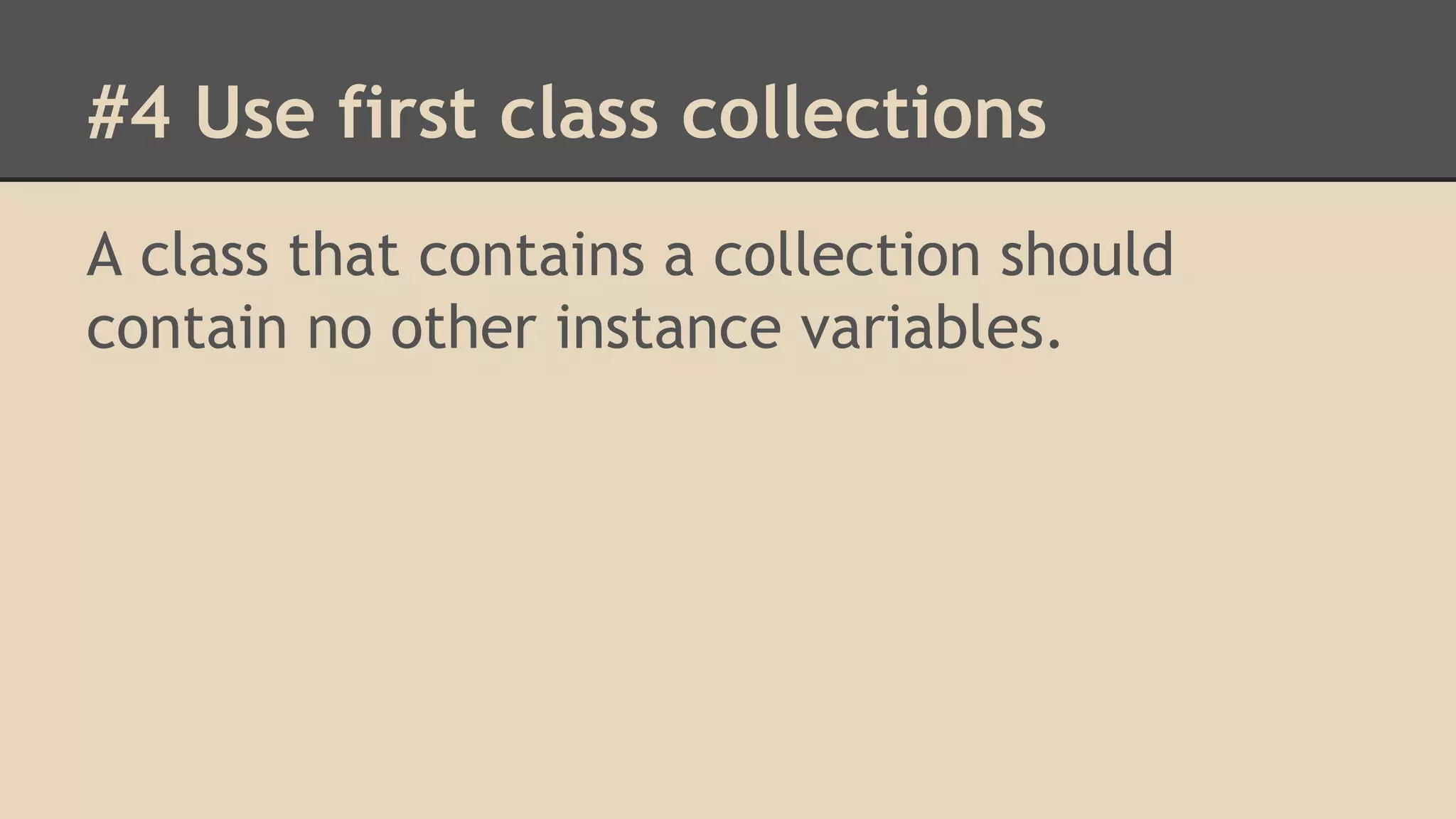
![#4 Use first class collections class Items implements Iterator { private $items = []; final public function add(Item $item) { // do add ... } final public function filter(array $filters) { // do filter ... } final public function merge(Items $items) { // do merge ... } }](https://image.slidesharecdn.com/gettingyourcodeintoshape-131216084721-phpapp01/75/Object-Calisthenics-Adapted-for-PHP-32-2048.jpg)
